This is a study in 3 parts on the impact of AI, Blockchain and Digital Marketplaces on professional services with a specific focus on the future of advertising
Quick Links
Thread 1 - The Agency of the Future: Part 1 |
Part 2 |
Part 3 |
Part 4 |
Bridges - Marketplace Models | Change the Story. Change The Game
Thread 2 - The Innovation Marketplace: Part 1
Part 2 |
Part 3 |
This Thread: Part 2 |
Part 3 |
Part 4 |
Part 5 |
Part 6 |
Part 7
Part One
Let's take a look at the challenge of building the agency of the future from another perspective
The business of building brands
We'll begin by reducing the industry's (any industry's) output down to a cost benefit matrix
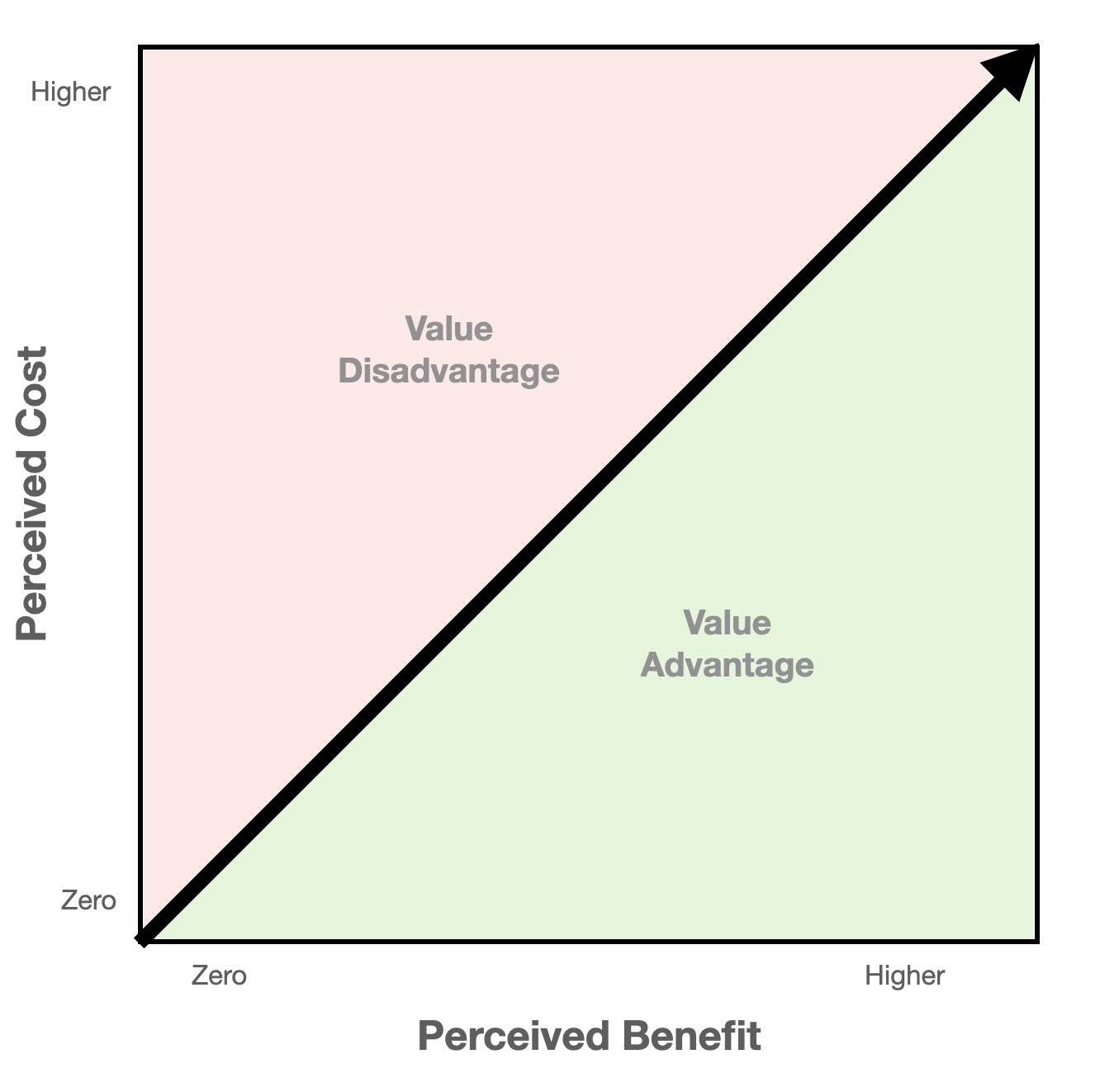
Basically anybody who delivers more benefit at a cheaper cost has a competitive advantage
Advertising and Marketing is the business of changing perceptions around the relative cost/benefits of a product service
So let's make a minor modification to the matrix to reflect that
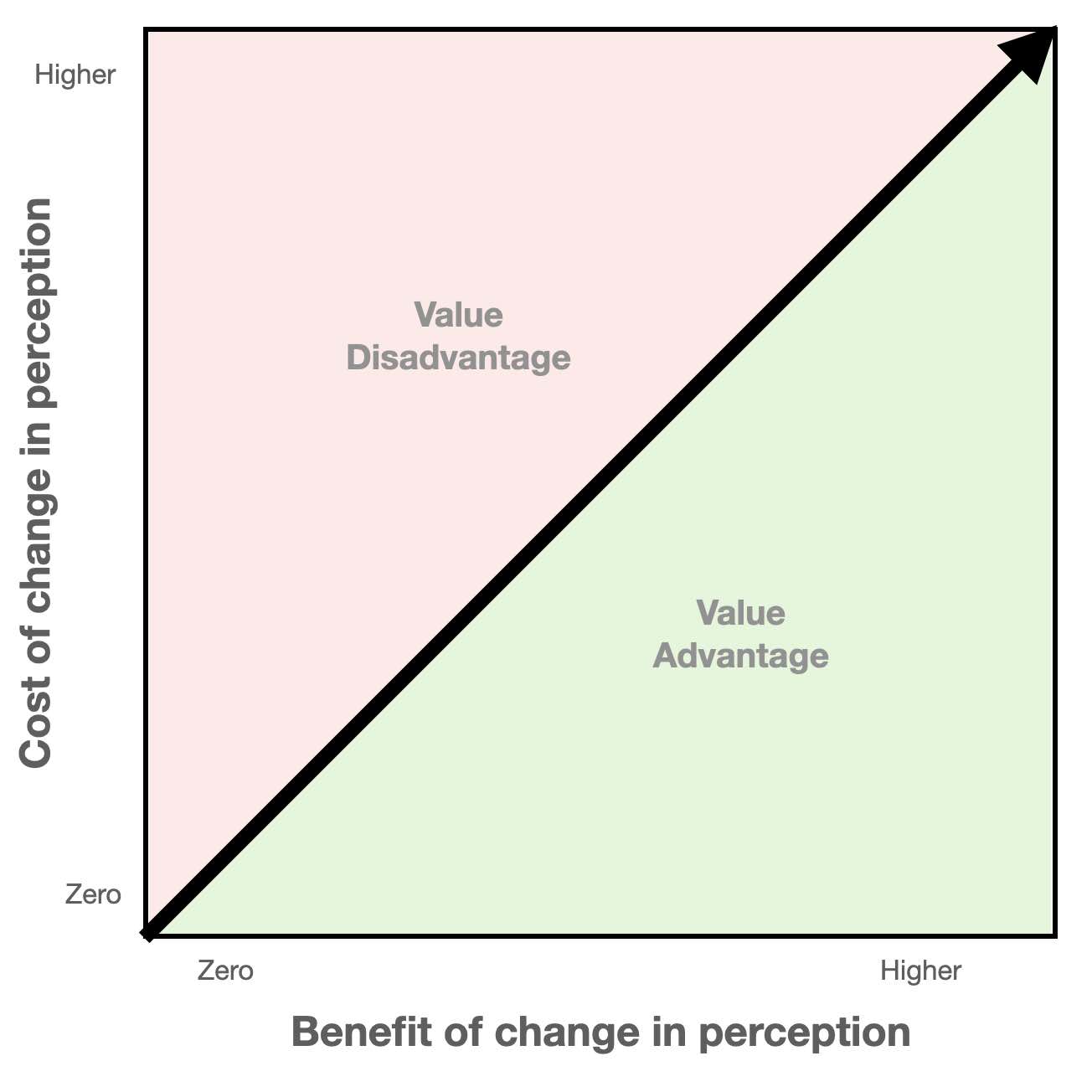
Now, if we change the word perception to reputation, we discover a common language that all players in the market understand (i.e. Reputation = Brand)
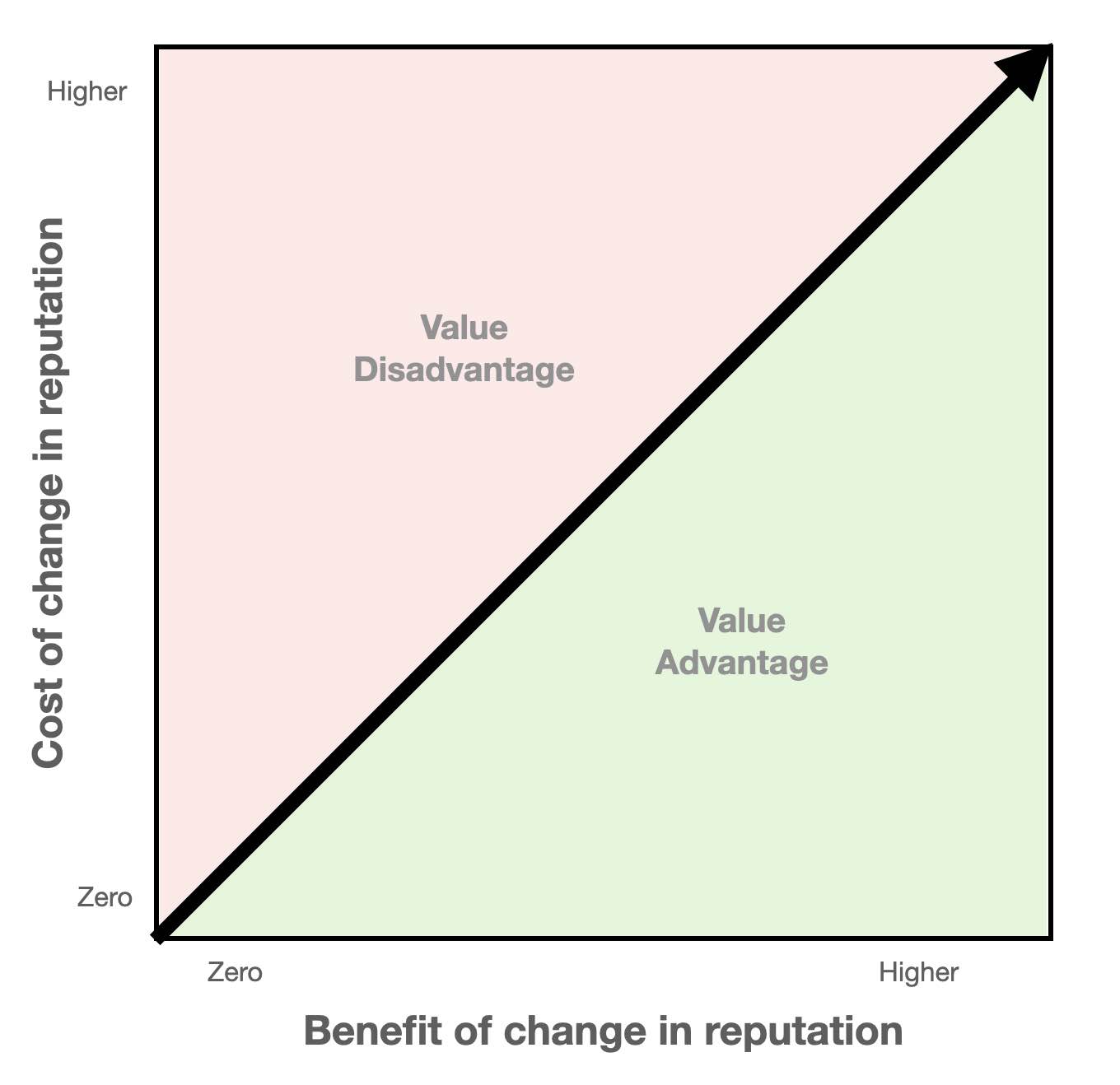
If we can take that idea step further and complete the equation (Perception = Reputation = Brand = Trust) we end up here
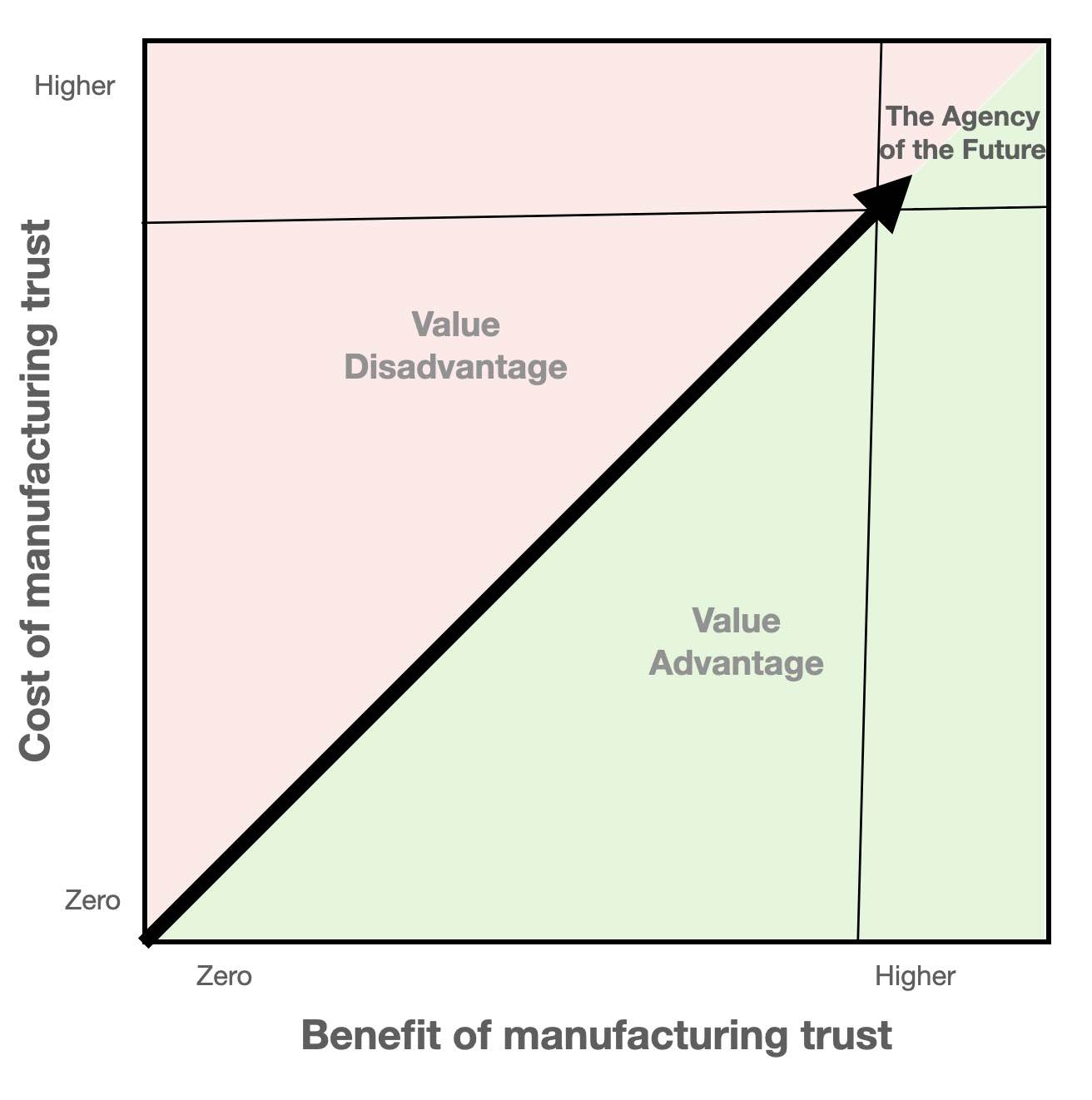
The idea of advertising and marketing being the business of manufacturing (the illusion? of) trust
i.e. Adverting agencies are trust factories
.... and they do this by generating or distilling a signal from all the noise
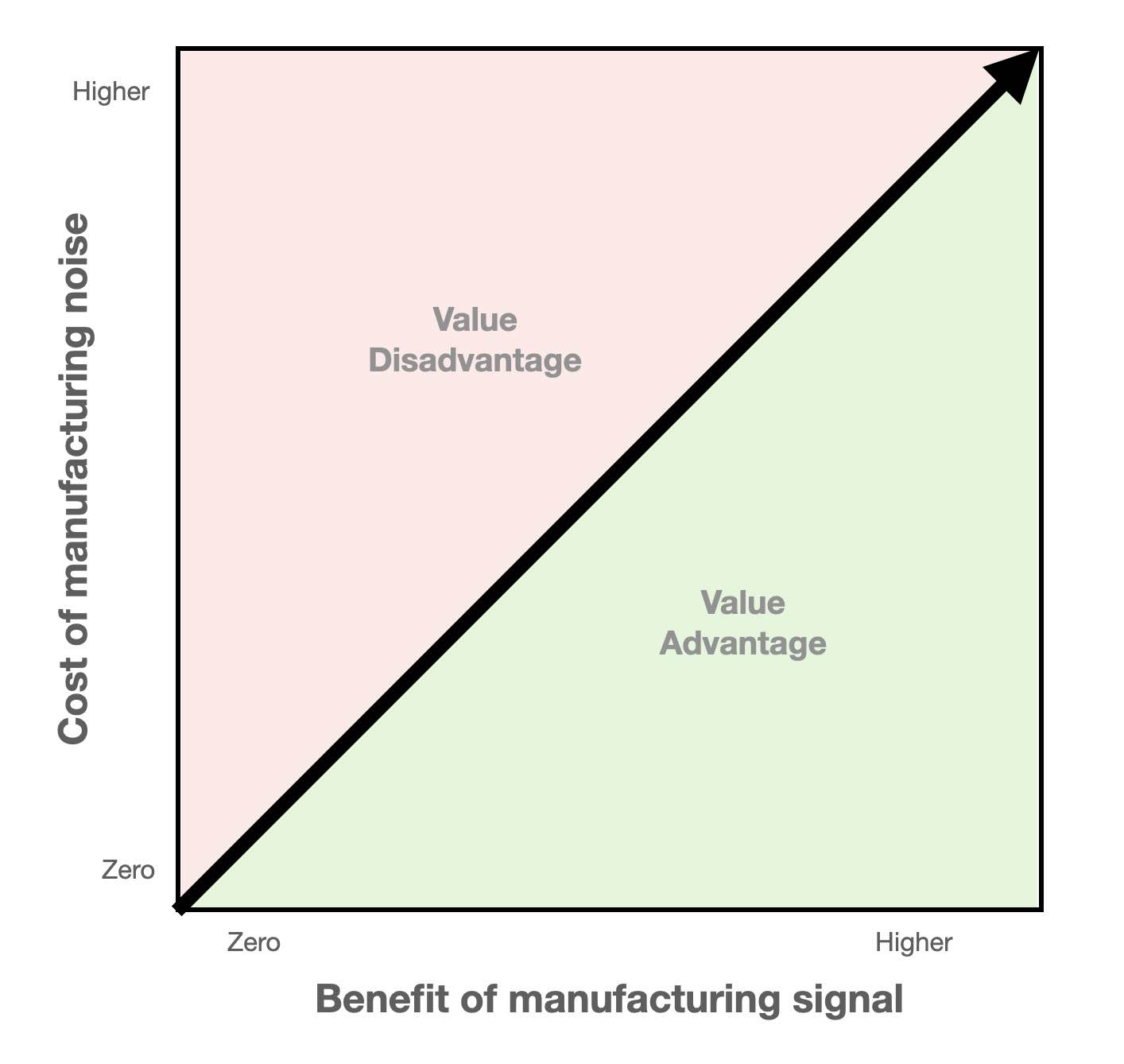
We now have a matrix to evaluate the relative position of the players within the landscape
For example social media
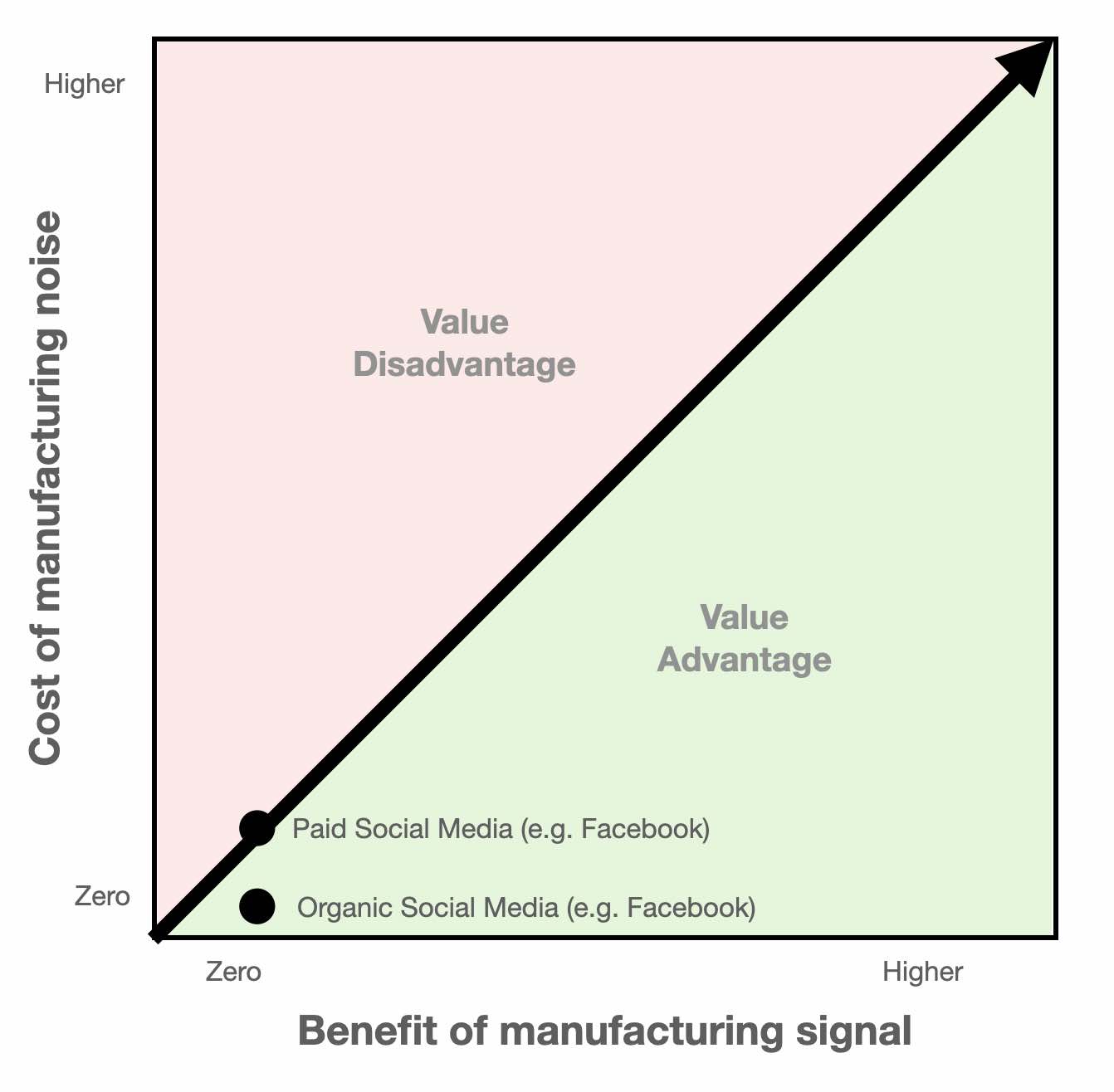
and search

It becomes very easy to to map the new media marketplace
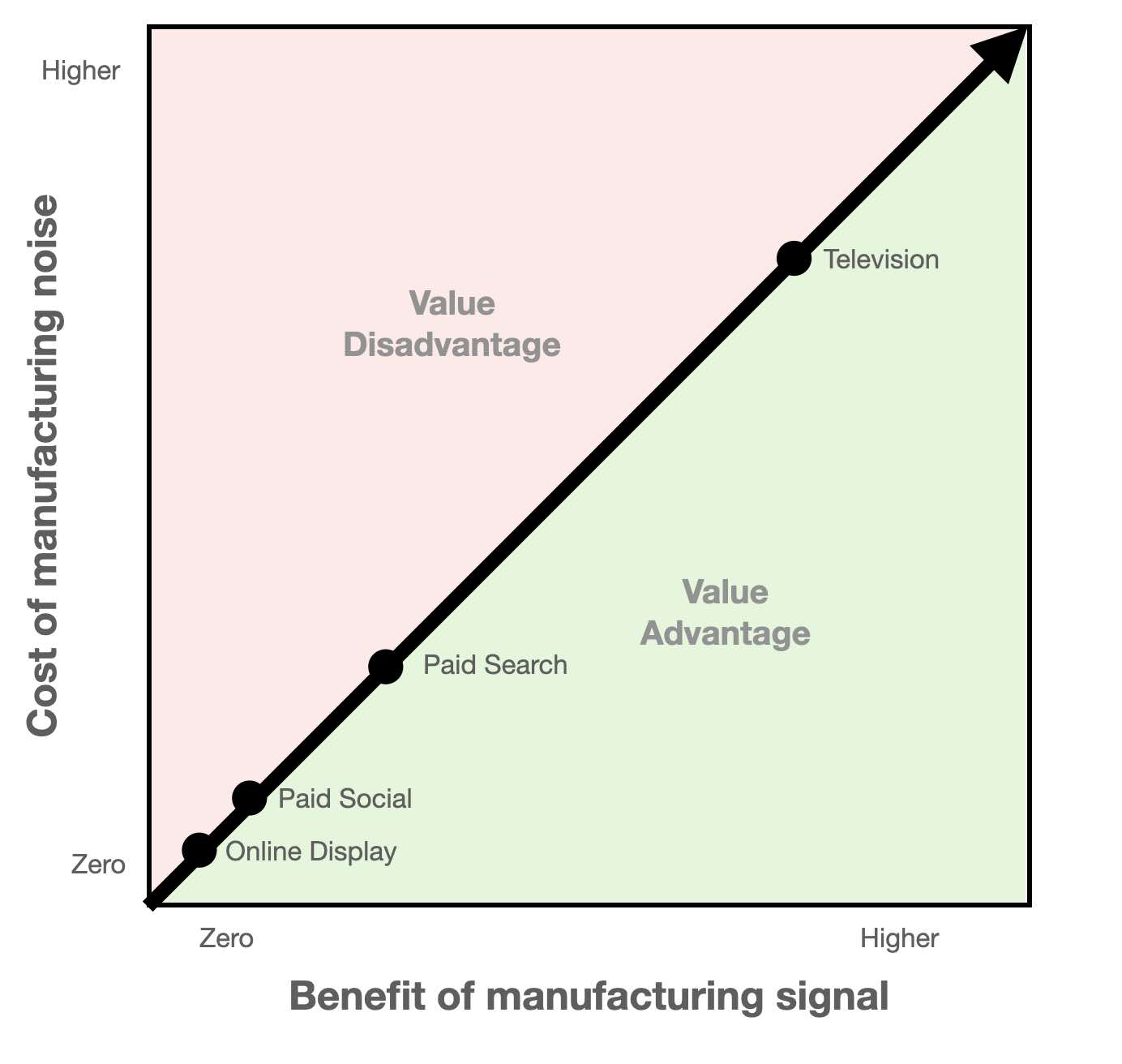
and then we can factor in the impact of creativity on the cost of manufacturing trust
and (sure enough) we discover value equates to creativity
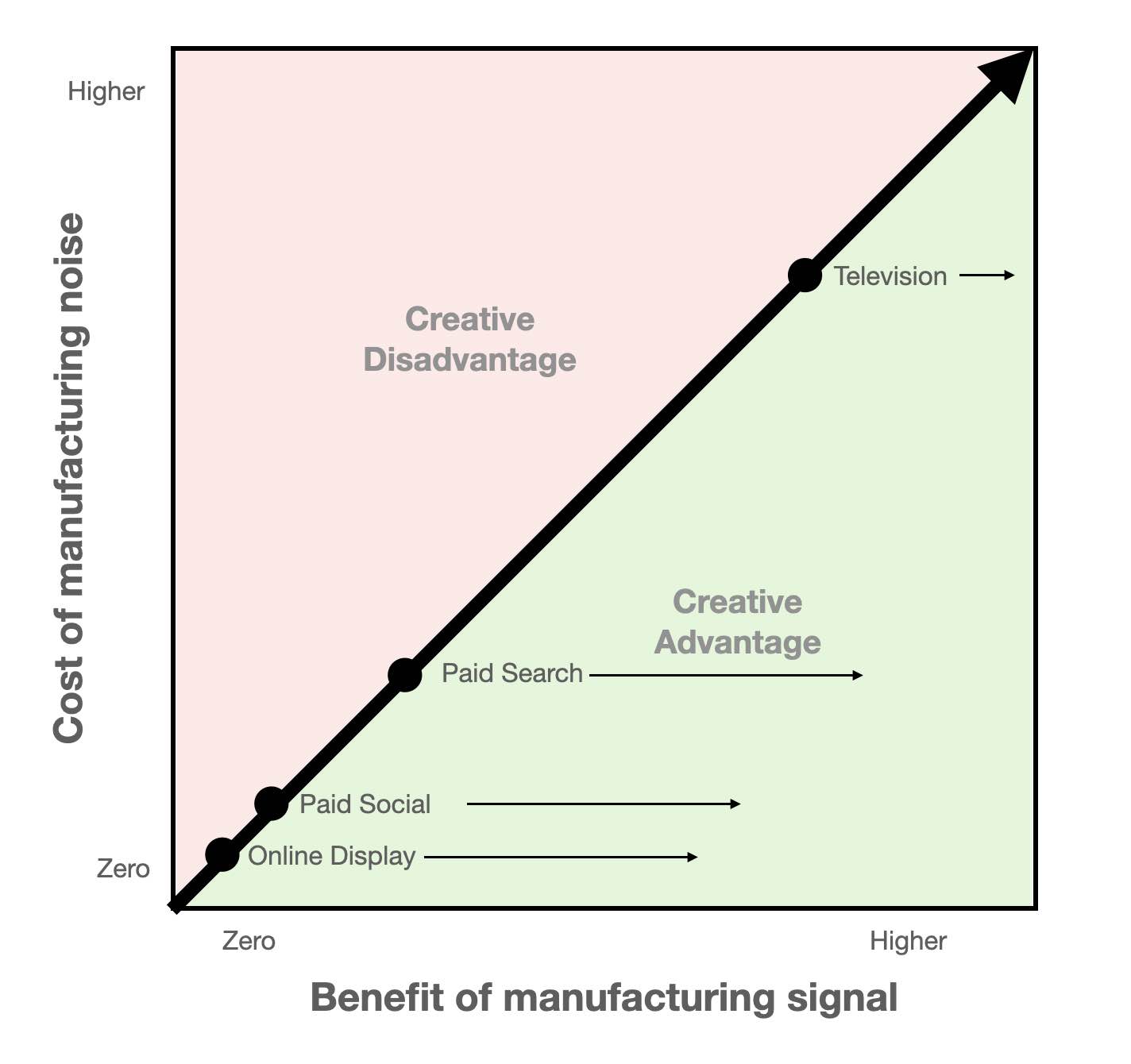
Why? because it is creativity that cuts through the noise and generate pure signal
... and this new reality is only being magnified by the long tail of digital economics
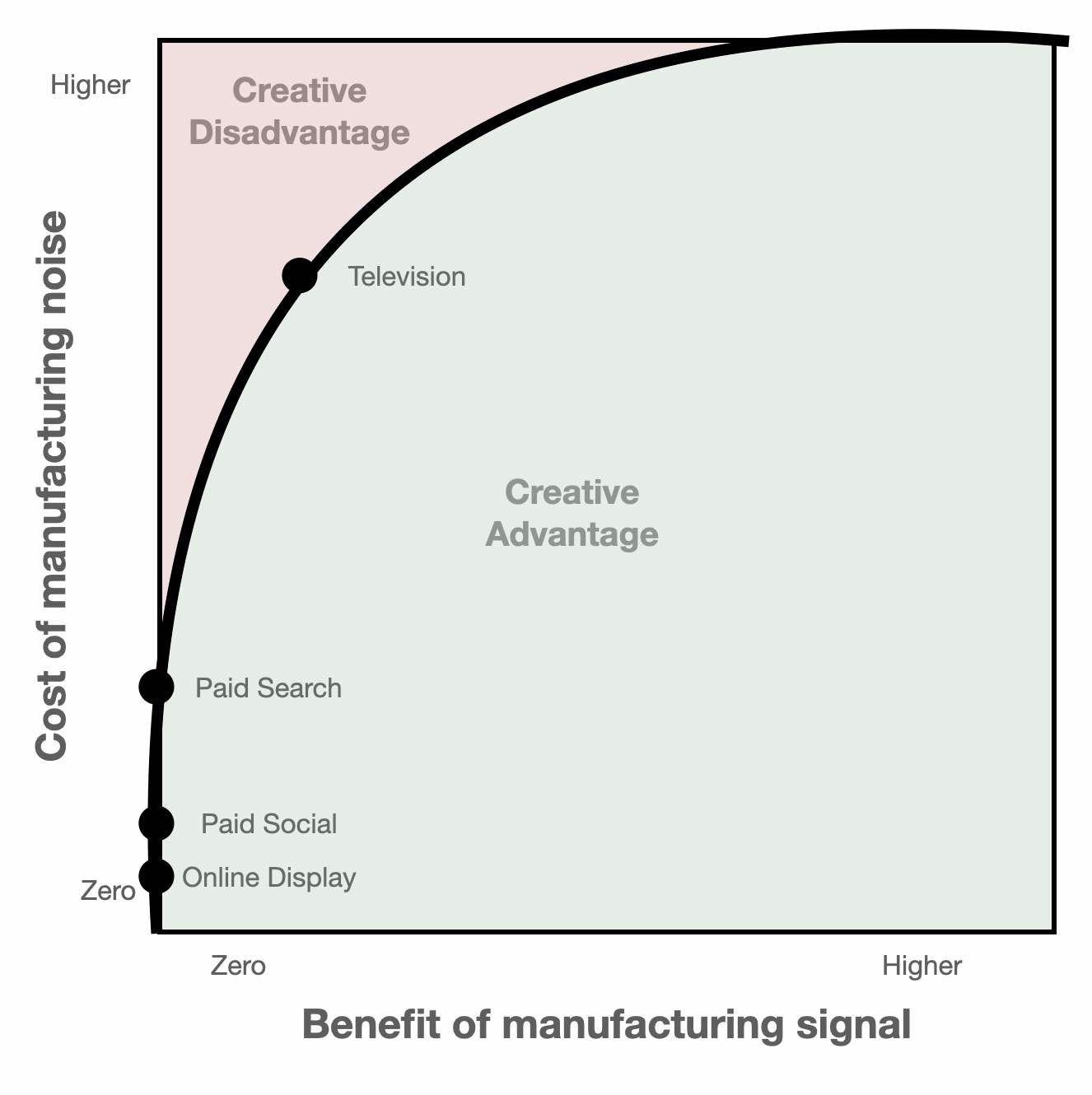
and this points back to something I pointed out over a decade ago... i.e. If you are paying for eyeballs today your creative is letting you down
But this also points to the heart of the challenge I outlined back then: When it comes to becoming the agency of the future how do you price the value of creativity in a world of free?
Because the cost/benefit perception curve today looks like this
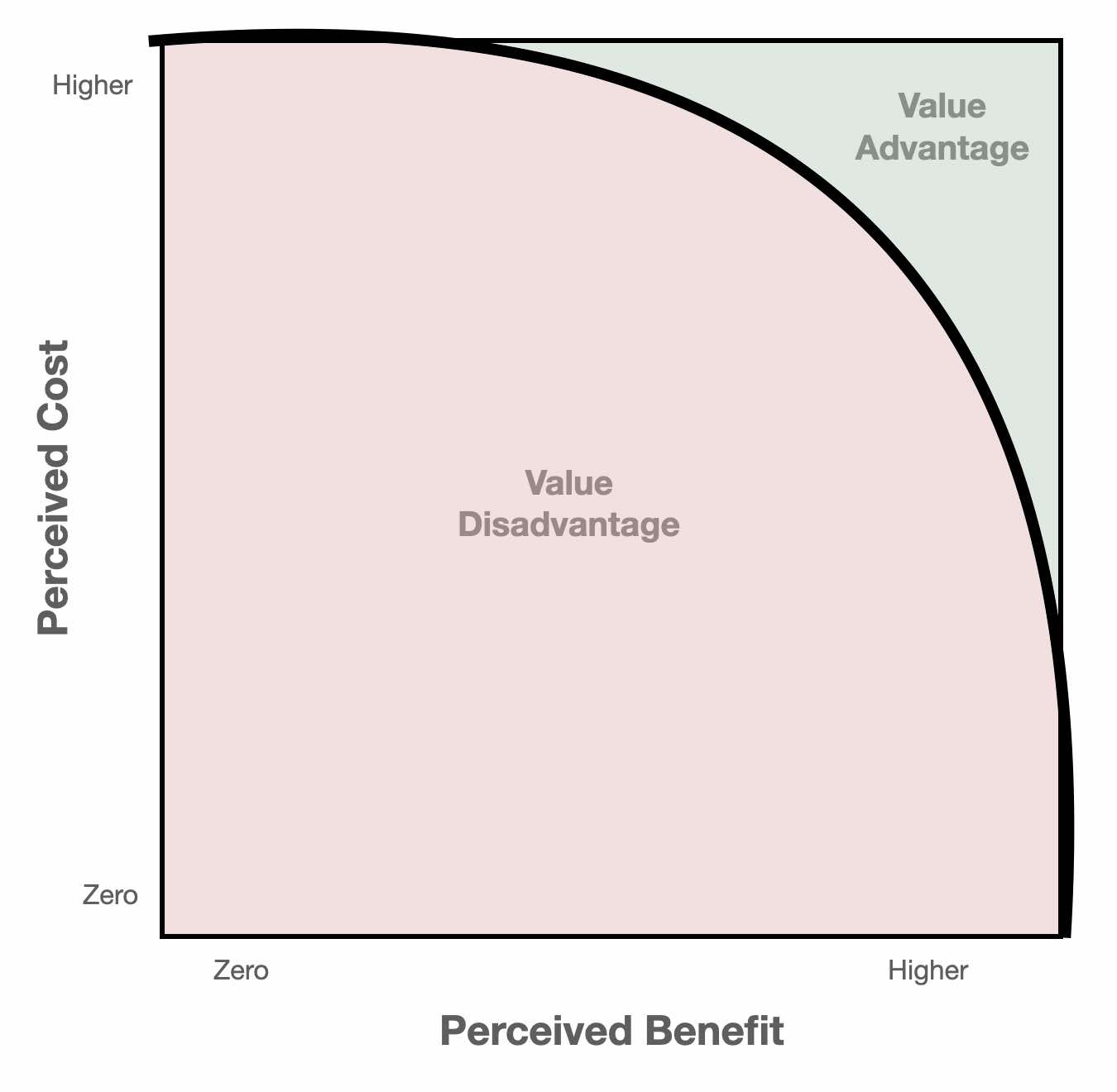
Map these two market perceptions together and you can see the conundrum facing the wider industry and the unique positional challenge facing the agency of the future
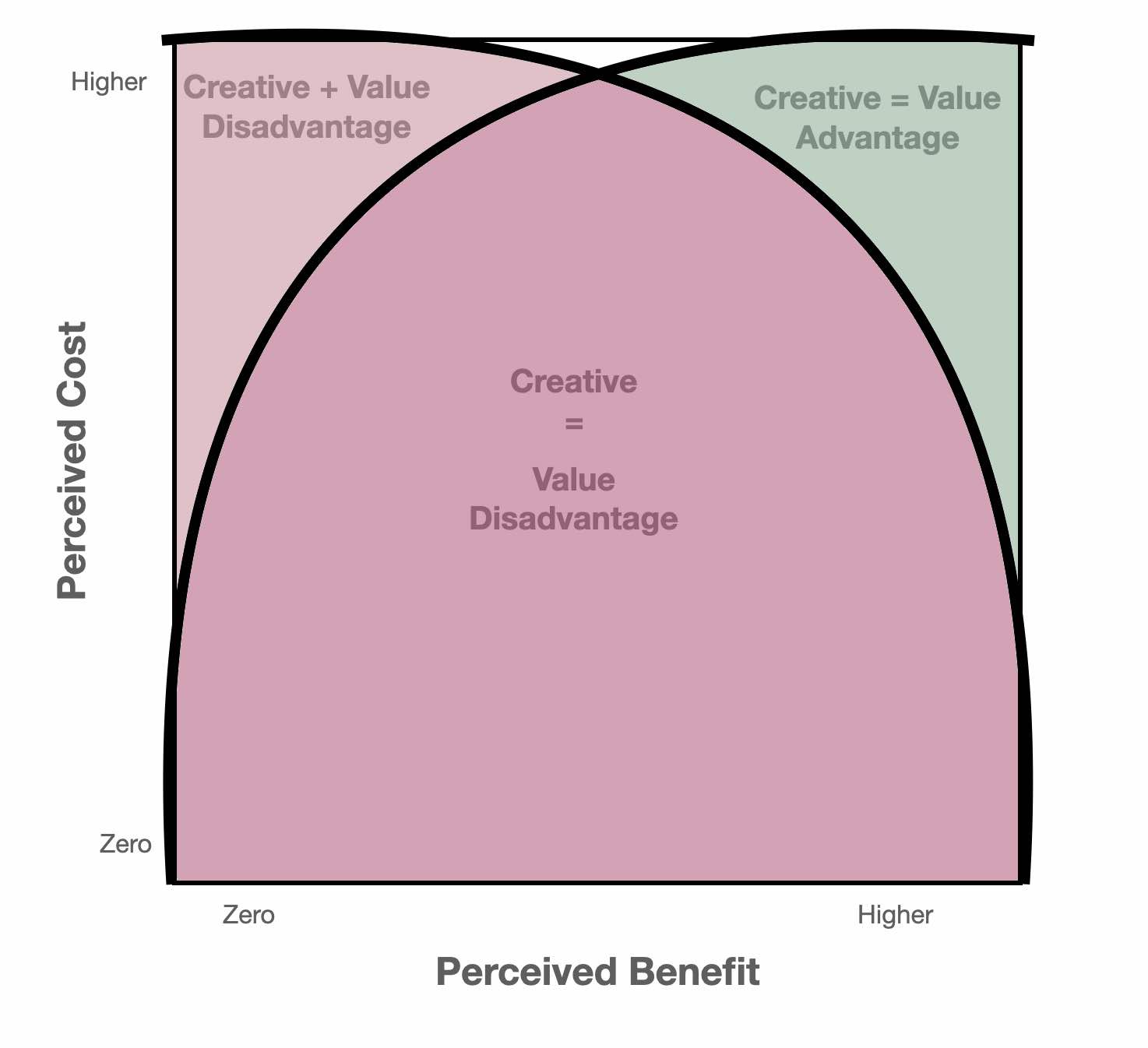
ie Zero Cost of Creative = Maximum Perceived Benefit
and that points to AI becoming the agency of the future... at least within the context of The Innovation Marketplace...
Part Two
So let’s continue this journey by revisiting the impact of the emerging marketplaces
Let’s begin by deconstructing the narrative
There’s Fiverr
The World's Most Talented Pool Of Freelancers Are Ready & Waiting (on a database)
There’s Upwork
Pioneering a better way of working (on a database), by helping businesses find more flexibility and connecting talent with more opportunities (on a database)
Then there’s freelancer.com
where you can…
Find great talent. Build your business. (on a database)
Take your career to the next level (on a database)
Hire the best freelancers for a any job (on a database)
Earn money freelancing (on a database)
Hire a freelancer (on a database)
Millions of people use a database to turn their ideas into reality
Browse portfolios (on a database)
Track progress (on a database)
Choose from 50+ Million Freelancers (on a database)
You get the picture... This is the new digital reality
Marketplaces are databases
Or, more accurately, the old paper trade directories, telephone directories and newspaper classifieds have evolved into databases and have been rebranded as marketplaces
The key difference being with the paper version you just paid for placing an ad or two these days you pay every time you transact with the database
Digital life is after all nothing if not Find me, find you and let’s exchange
This is digital disrupting paper 101
And how does all this digital disruption compare to the old way of doing?
We discover Upwork and Fiverr sit comfortably in the mid-tier of the long tail
The rest trail off into the abyss of the long tail. Niche agencies, niche databases, niche marketplaces. Niches within Niches... etc
But the key observation here is the real action is happening at both the top and the bottom of the tail.
The traditional agency conglomerates and their consulting services disruptors are now trapped in the middle.
You might call it a squeeze play
Or, a grand game of aggregating and monetizing the world's creative talent
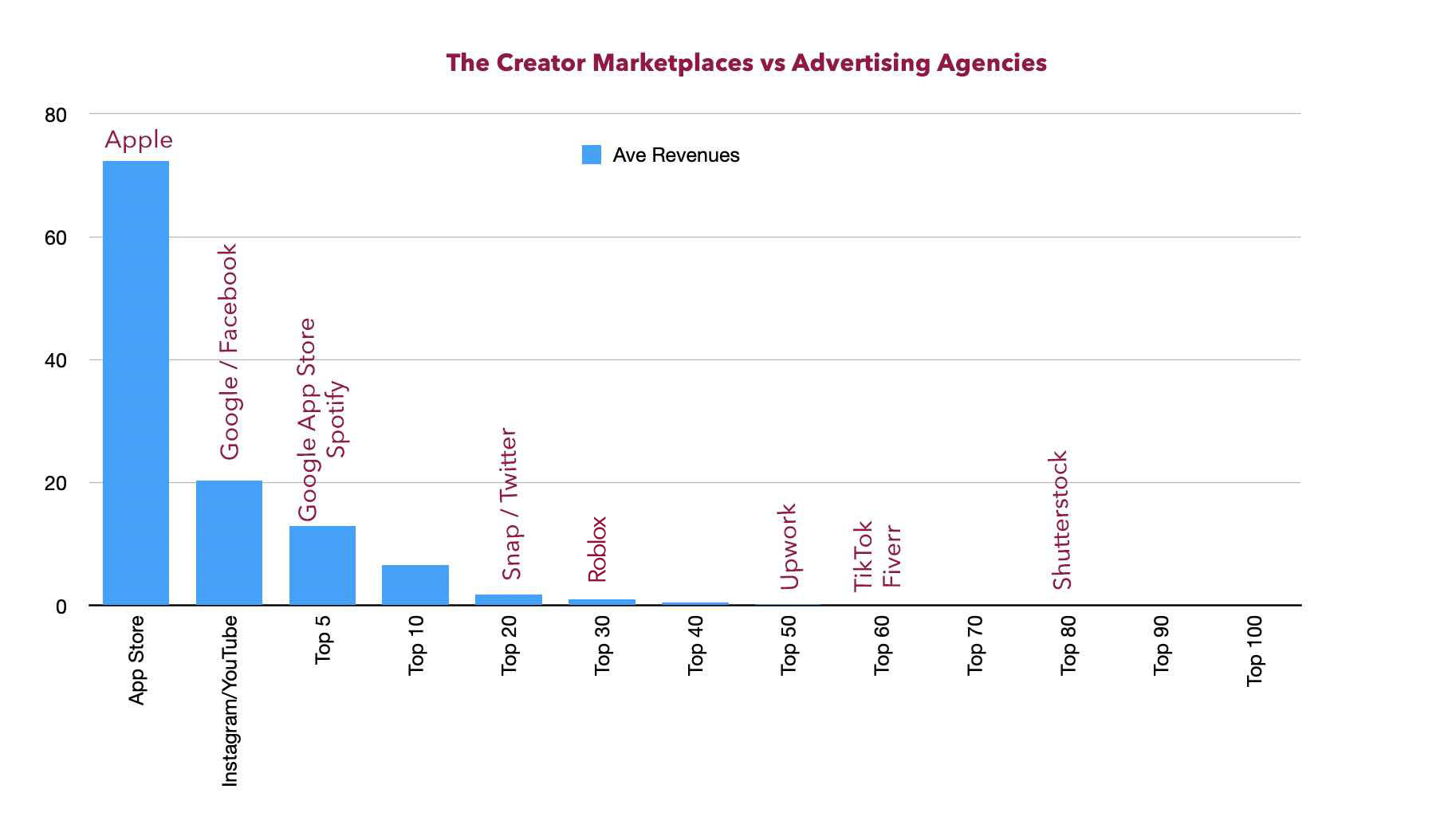
Either way. It's becoming pretty clear the databases are winning the war for talent
Repositioning databases as the new creator economy is the killer narrative of our time.
Clearly Silicon Valley is beating Mad Ave at its own game
...and the introduction of NFT has taken that disruptive narrative to a whole new level
But let's put that aside for the moment and explore the economics of these relational databases by redefining the traditional agency offering in terms of a database solution
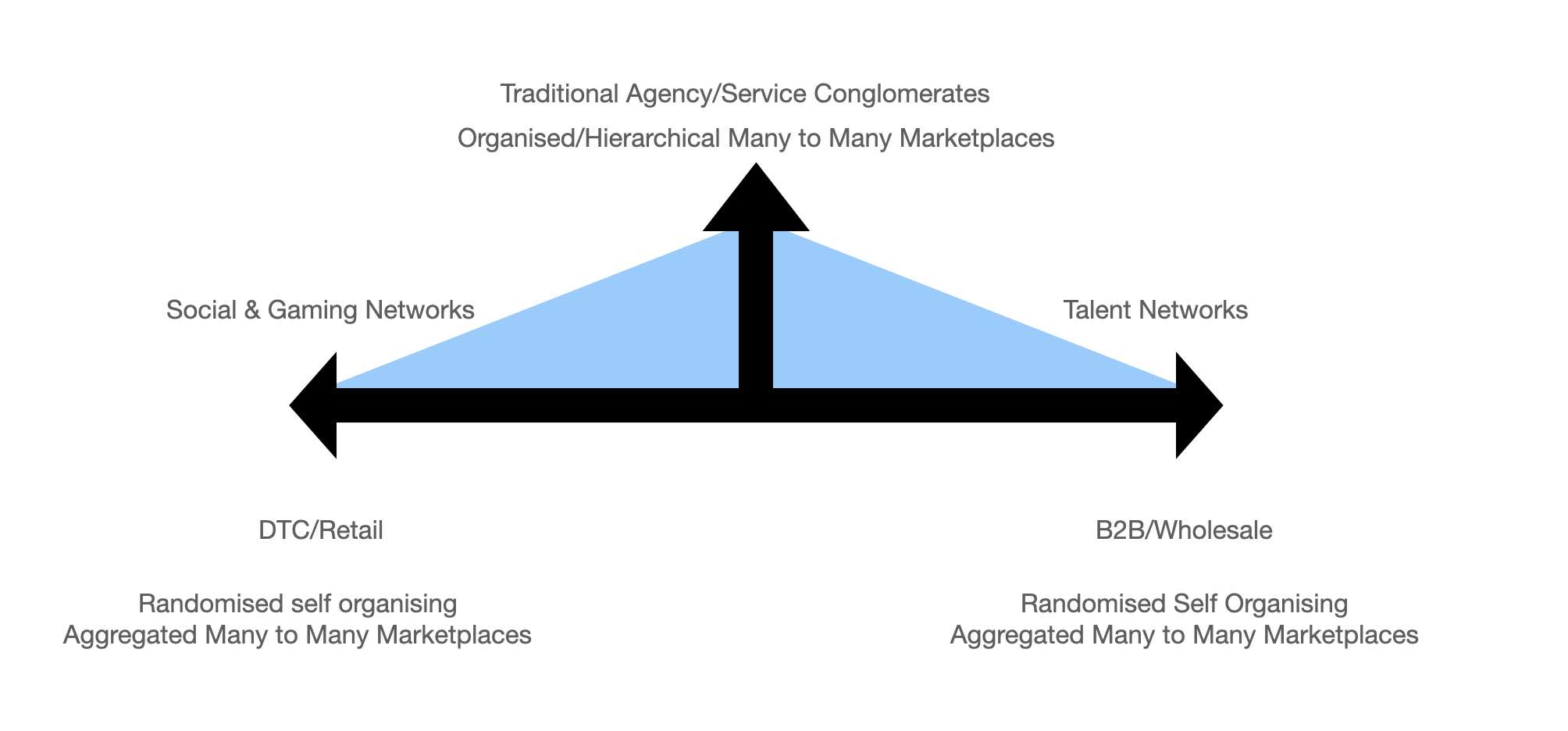
Agencies have a talent pool. Clients have a talent pool. Project delivery involves engagement on a many to many relation
The talent marketplaces don't have that problem. They are in the business of aggregating one to one relationships. Think: (SMB owner engages Designer)*n
Neither do the social media and games networks. They are in the business of aggregating one to many relationships. Think: (Influencer engages followers)*n
Both the talent marketplaces and social media networks function as transactional databases... it is just a question of frequency
Increased frequency = more transactions = more revenues
The secret sauce is gameification. 20 years on and we all understand that is the game when it comes to growing a database for friends... or anything else for that matter
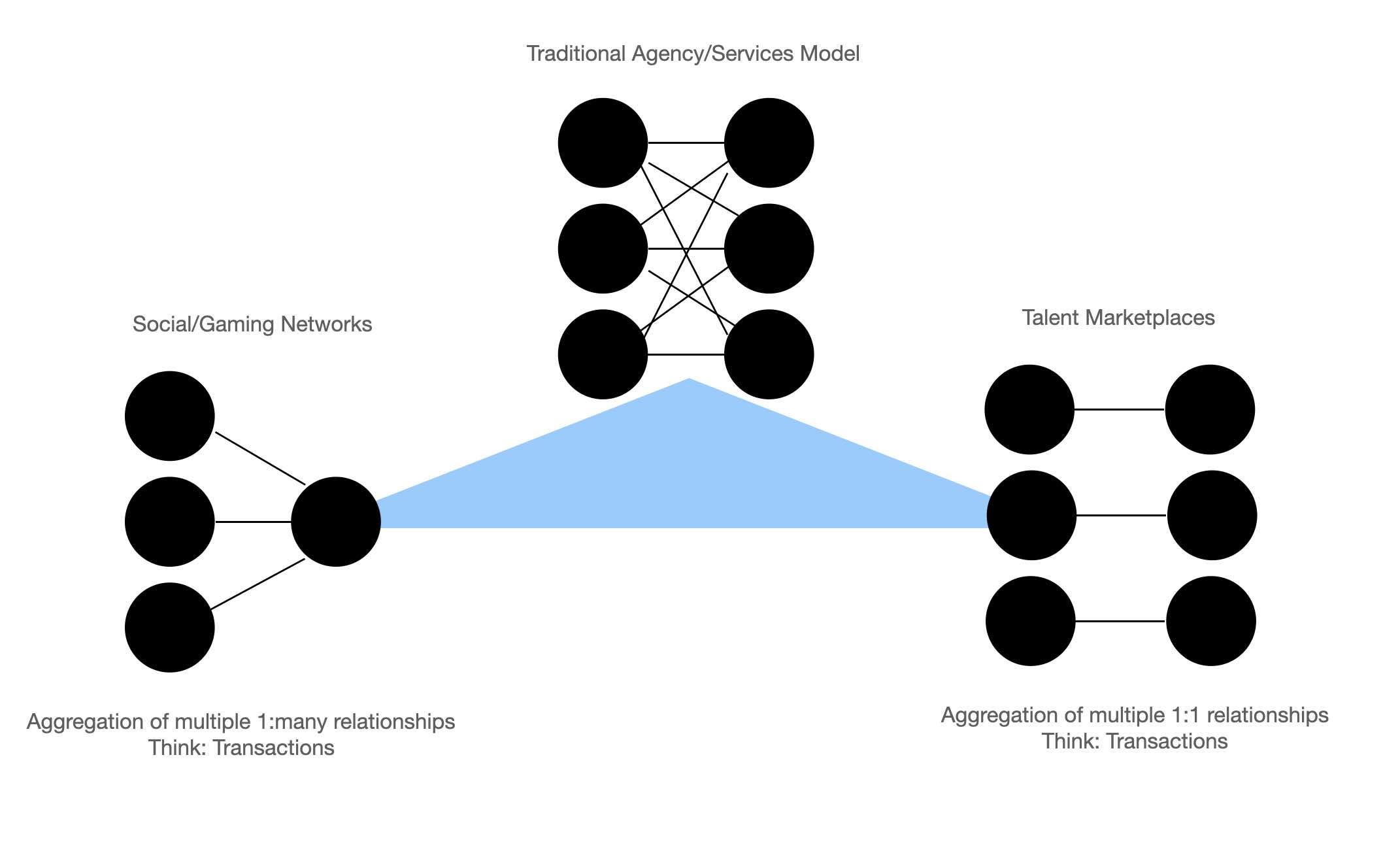
What is interesting is if we try and merge that insight with the old business lifecycle services model
We discover logically the talent databases service the small end of the market but break when then try to evolve to service the head of the tail
We discover surprise, surprise the data model that services the head of the tail - the corporates - looks more like a neural network than a transactional database
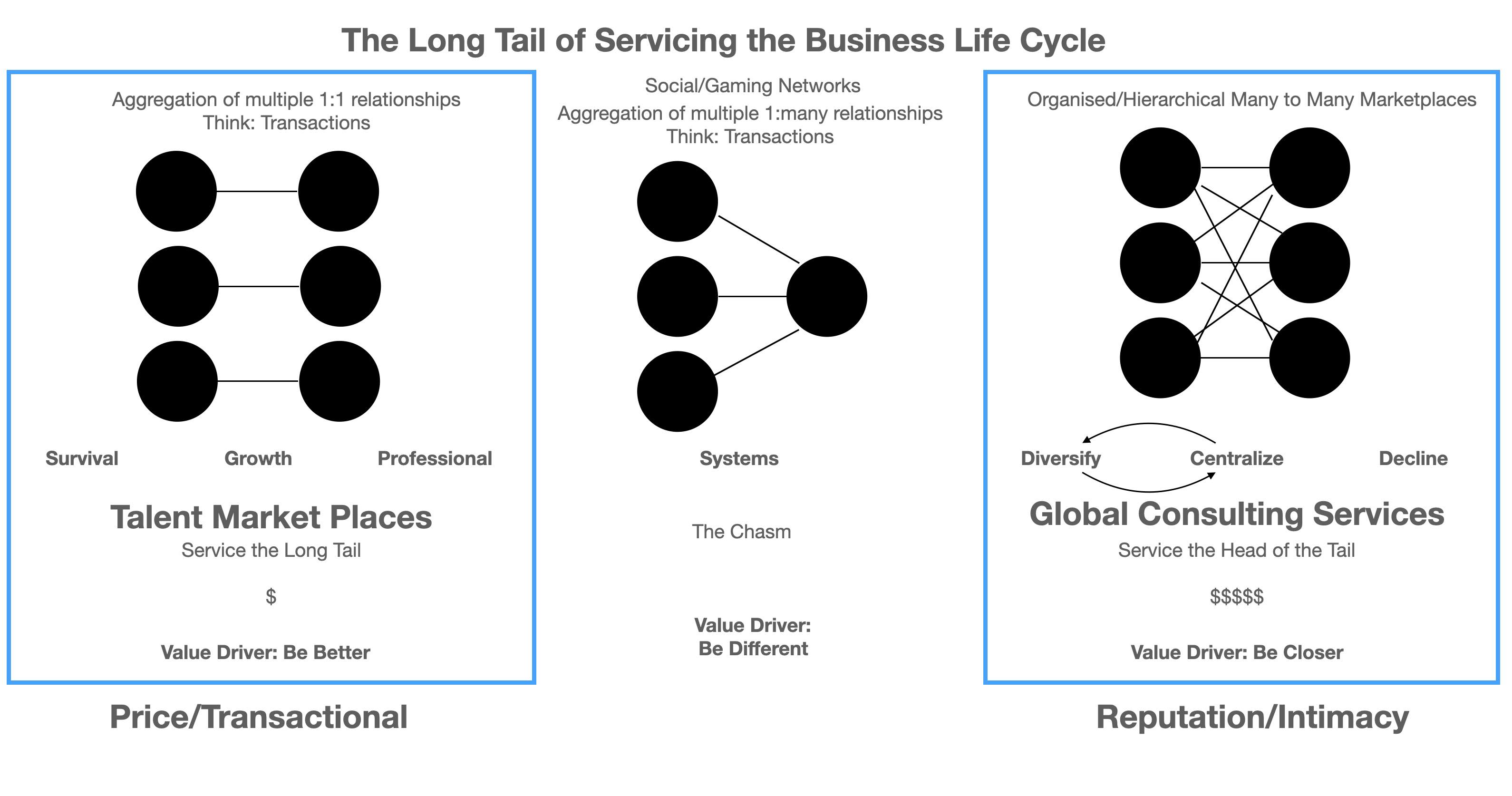
... and that, when you think about, is a key insight.
It tells us a lot about what the agency of the future may look like
It suggests the client agency engagement model may well look like the merging of two or more neural networks - Digital and/or organic
and I think that goes a long way towards resolving the $100+ Billion question:
Is zero or at least marginal cost AI the future... Will it become just another game trading algos?... and endless creative arbitrage?... Just like digital media buying is today (Think AdTech)?
Will AI have the smarts to become that zero cost rainmaker with clout?
...and that brings up the deeper question: what happens to the value of reputation when the price of reputation is free?
Or, more accurately, what happens to the value of trust when the cost of manufacturing trust is free?
This then, as Trump has already illustrated, is the grand paradox of our time
But putting those questions aside we can see what the agency of the future may well look
It could well be the trusted API that allows these disparate, multi-functional neural networks to communicate and trade (AKA the new AdTech back bone)

Or, more probable a multi-functional network of neural networks that communicates and trades in R/T with these disparate, multi-functional neural networks
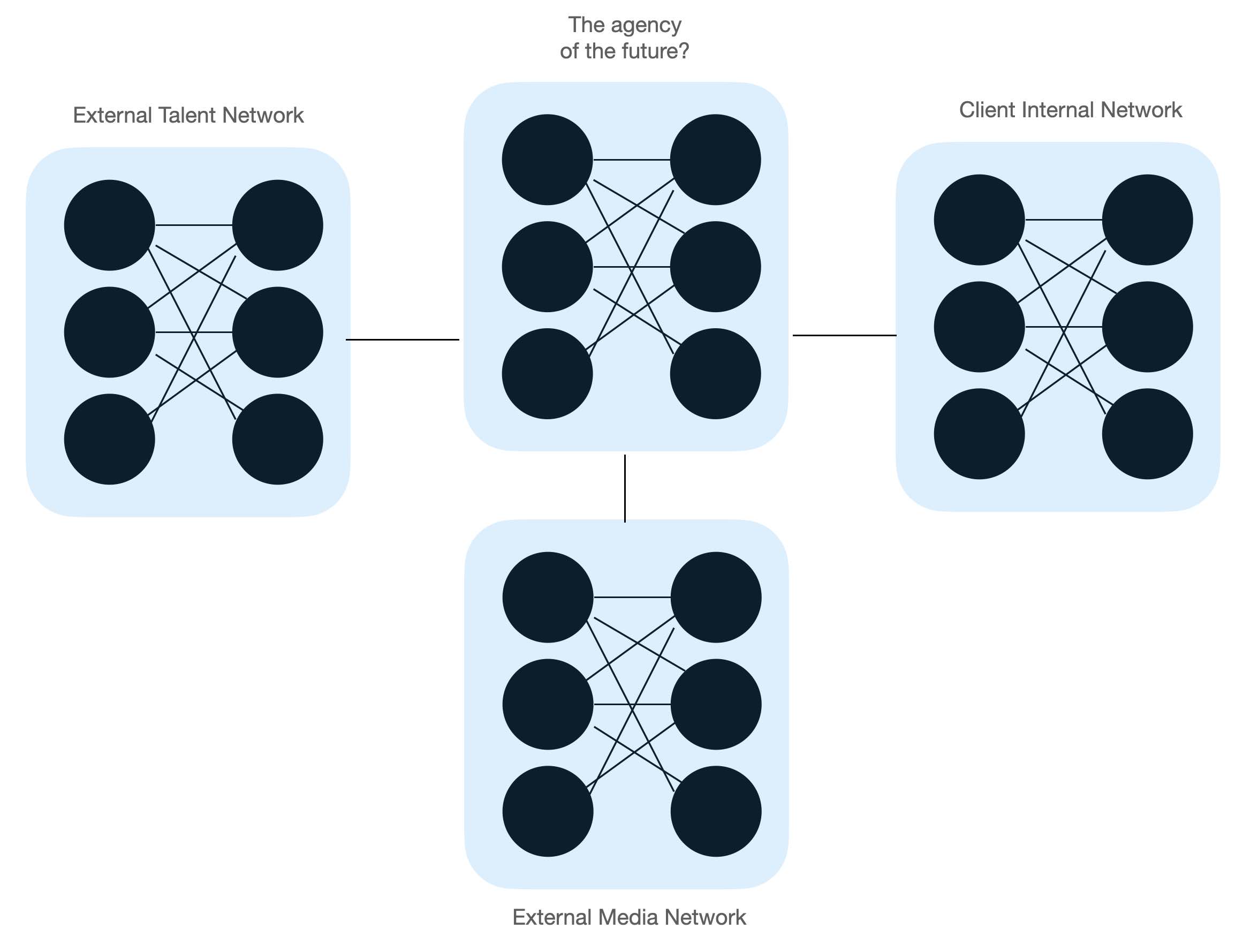
Part Three
Now let's turn our attention to the next disruptive wave of talent databases
Let's take a quick look at the DAO (AKA The Decentralised Autonomous Organisation / Crypto Tokenised Community) model
To keep things simple I'll use BrainsTrust as the defacto example
The value proposition of the crypto model is very simple
Intermediaries are expensive. Talent marketplaces like Upwork, Fiverr and TopTal are basically self service headhunters and recruiters. What happens if we remove the cost of utilising intermediaries?
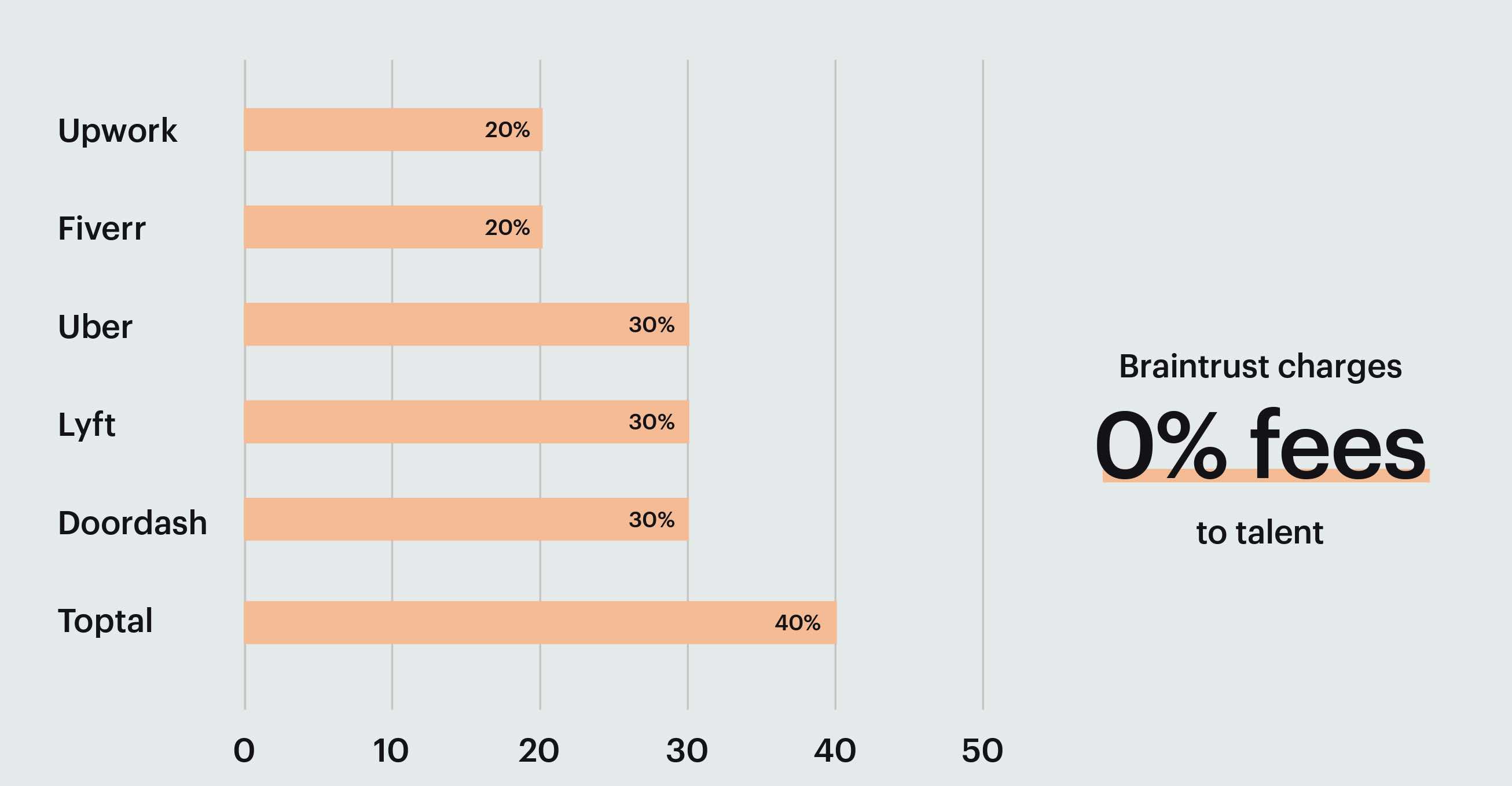
If you examine their whitepaper in detail you will discover the model is based on two key assumptions
A: The trusted advisor (these rainmakers with clout) are redundant or at worst can be replaced by referrers
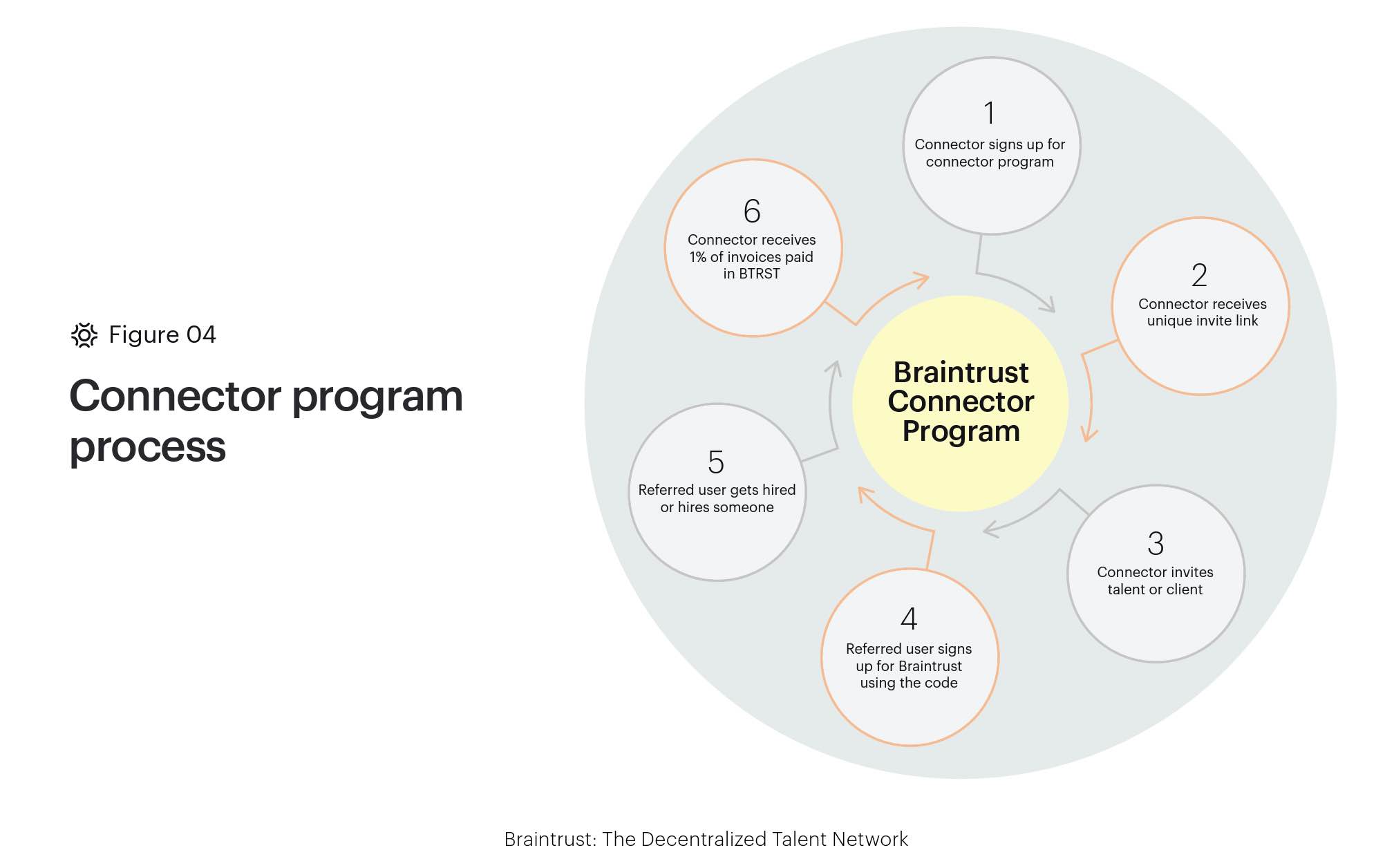
B: The Community of talent and clients is self regulating or at worst can be managed through an arbitration process
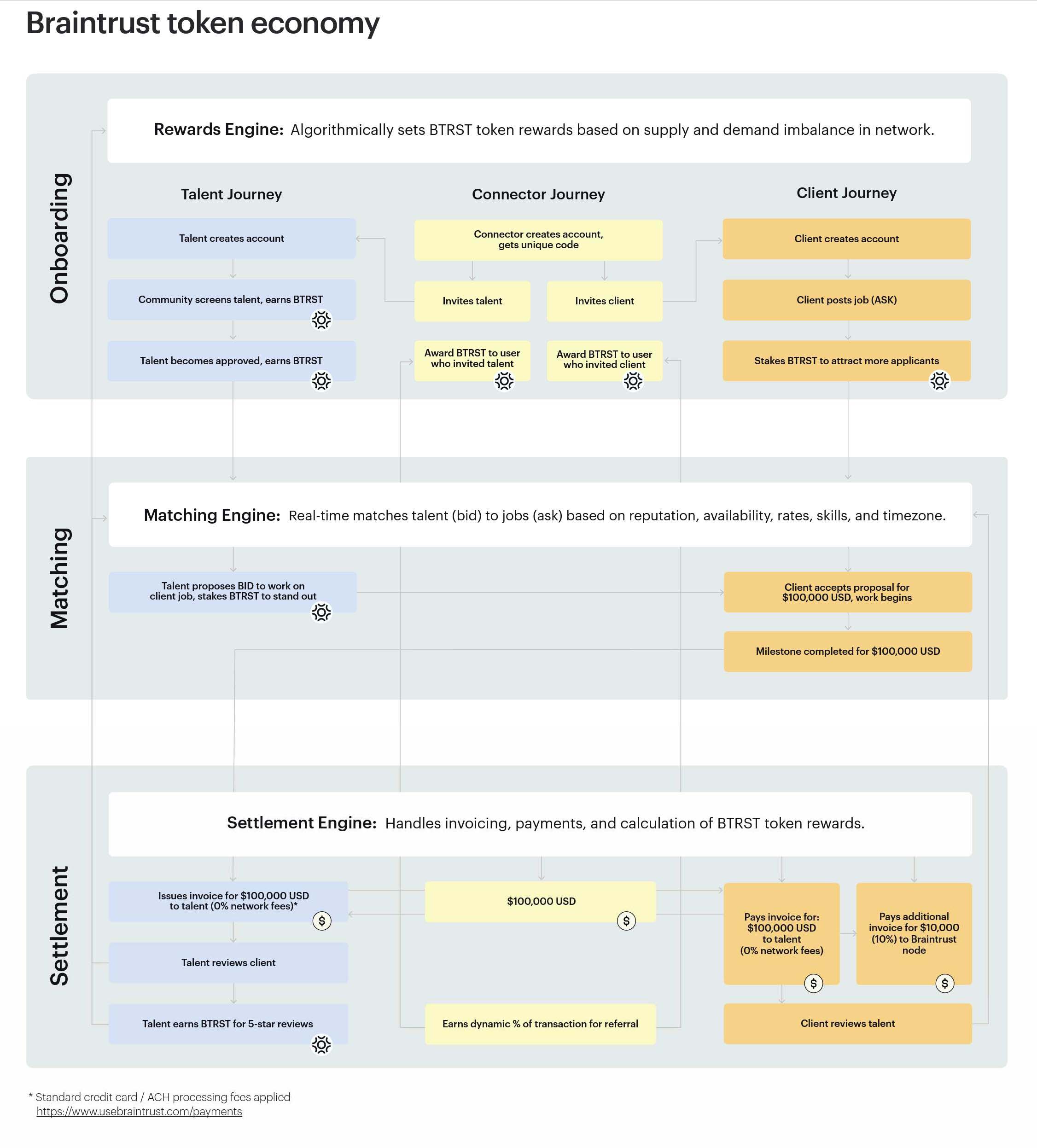
My initial reaction is the model underestimates the role of both the referrer and the arbitrator with the service industry marketplace dynamic
Basically it is a misreading of the role of the trusted advisor (Who is both referrer and arbitrator of trust across the network)
To illustrate this point let's take a quick look at the history of banking
In the beginning Gold was left with goldsmiths who had a means of storing and protecting it. The owner was given a "certificate of ownership". This certificate became the way of settling debts. Fast forward and we discover Gold has been removed from the equation and we now have the Federal Reserve and 'fractional banking'
The essential lesson here being the arbitrators of trust (The Goldsmith/Banks) utlimately dominated the pricing of trust across the community/network/activity. So much so that today they have inflated it to the point where it has become, if not meaningless, then at the very least, an abstraction of the operational realities of the marketplace
Suggesting the very authorities we put in place to regulate/arbitrate conflicts eventually serve to exacerbate conflicts... why? because they become the most profitable/lucrative/fastest growing part of the transaction/activity across the network
So rather than being the long term solution to the trusted network these crypto projects are potentially fast tracking an explosion in the problems they are designed to solve
Whether they know it or not, through their investment in building technology empowered untrusted networks, they are in reality designing a future for highly centralised, fractional trust arbitrators to emerge
i.e. History teaches us power in an untrusted network ultimately resides not with the self regulating network but with the nominated arbitrators tasked with resolving conflicts within the network
Now the designers of the Brainstrust have introduced two controls/measures around this challenge
The first is the decentralised arbitration model
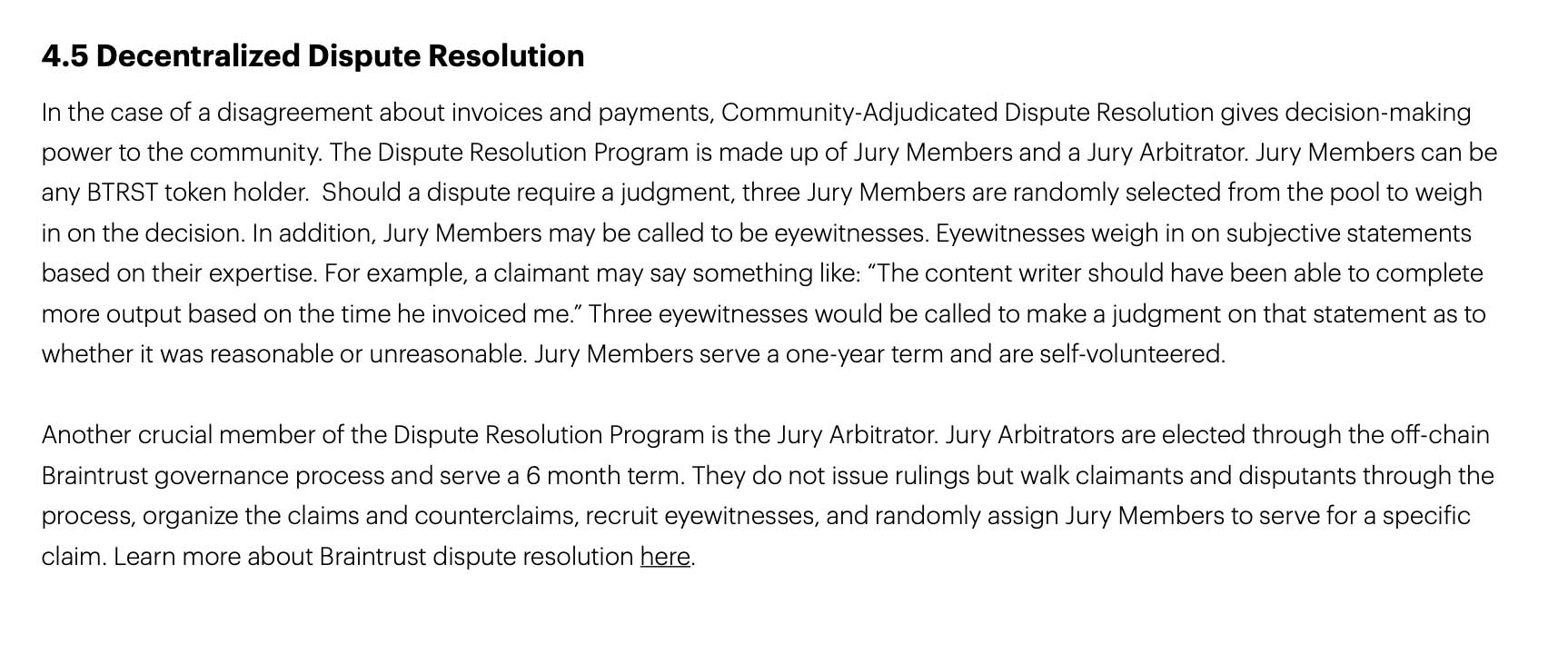
Now it would be generous to allude to this framework as innovative given that it is merely the conflict resolution panel format of the self-regulating industry mediation model that has been adopted by the professional associations of the advisory services professions (e.g. Legal, Accounting, Real Estate, Insurance) for millennium...
The second is trust or what you might describe as reputation "staking"
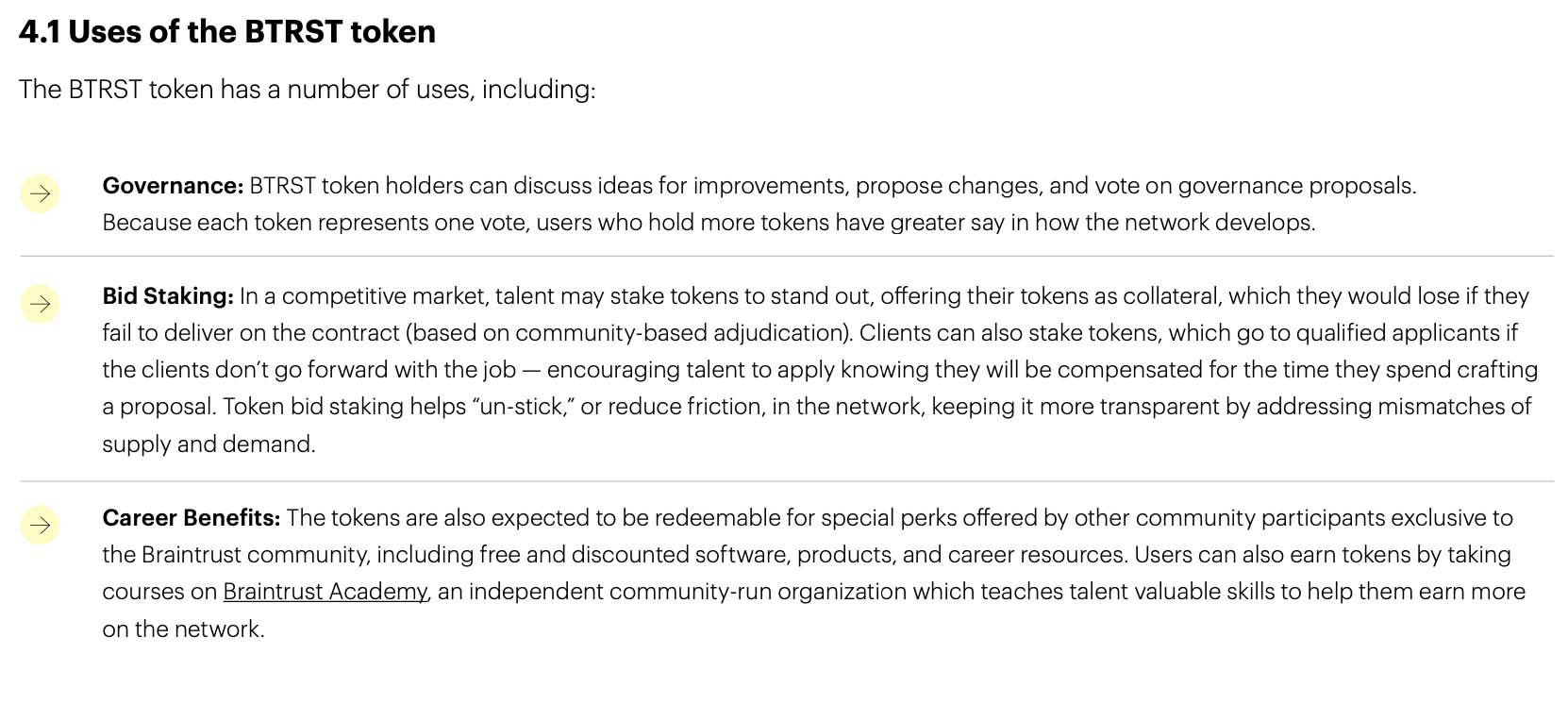
"Staking" being of course the crypto equivalent of buying Adwords, Likes or Influencers to drive traffic to an eCommerce site... table stakes
and this raises the question what advantage does the tokenized crypto DOA model bring to the table?...
Very simply?... arguably nothing...
As to the question: Why?
The answer is, like everything blockchain, it is based on a flawed understanding of how trust is created and distributed across a marketplace
Blockchain's fundamental flaw is it is based on a nodal concept of trust
It applies the principles of ITC network theory to modelling complex adaptive systems
It assumes the problem with trust is there are no Trusted Nodes. All nodes in the network are potentially untustworthy
It is essentially a blunt, expensive and inefficient instrument trying to resolve the challenge of recording a complex tune played by many people simultaneously scattered across a marketplace
I would argue trust - or more specifically a trusted relationship - is better understood as string theory
Yes, we can see and count the nodes. Yes, we can see and count the connections. Even the transactions. But trust isn't the sum of the nodes or the connections or the interactions between the nodes
Trust is not a distributed ledger
Trust is not a number
Trust is the tunes. The harmonies. The discordance. Played out within, between the nodes and, most importantly, by the nodes
and I would argue the ledger - distributed or otherwise - is to trust what notation is to music
An instruction set for recreating a memory
Nothing more. Nothing less
The key insight here is trust isn't so much a transaction as two strings being plucked and stretched until they are in tune. In harmony
Understand this and you'll understand the key to unlocking the secret of becoming the trusted advisor is your ability to preemptively resolve conflicts before they become destructive to the relationship. This is what determines the value of your reputation in the marketplace
ie. The building of trust isn't a sale... it's a negotiation... a dance of seduction... a mating game
The key point is that trust must be earned and deserved. You must do something for the other person to give them the evidence on which they can base their decision to choose to trust you. You must be willing to give in order to get.
- David Maister
Ultimately trust is about reciprocity
A blended experience
Conflict resolution is the skill the trusted advisor brings to the table
It is this ability to resolve problems that sets the rainmakers apart from the other players in the market
They are in the business of making problems go away - mostly by bringing other people to the table and brokering the deal
And they are paid handsomely for it
Think about the leading brands in the consulting sector
The Mckinsey's, the BCGs, the Accentures of the world
What do they bring to the table that sets them apart from the competition?
The perception they are too big to fail... Translation: Their reputation is their margin and they'll do anything to protect it
They are masters of de-conflict thinking
They are masters of gaming the banality of trust to their advantage
They are masters of managing market perceptions
They are in the business of playing the tunes the market wants to hear
The siren songs of trust...
Ultimately the art of the trusted advisor boils down to a single observation: No Conflict. No Interest.
The challenge for the DOA is just how much trust can you put in an untrusted network?
What do you have to introduce... what do you have to change... to create trust in the network?
And this observation takes us back to the conundrum facing the agency of the future

And we now understand the challenge isn't - and never was - about being better... it is - and always was - about being trusted
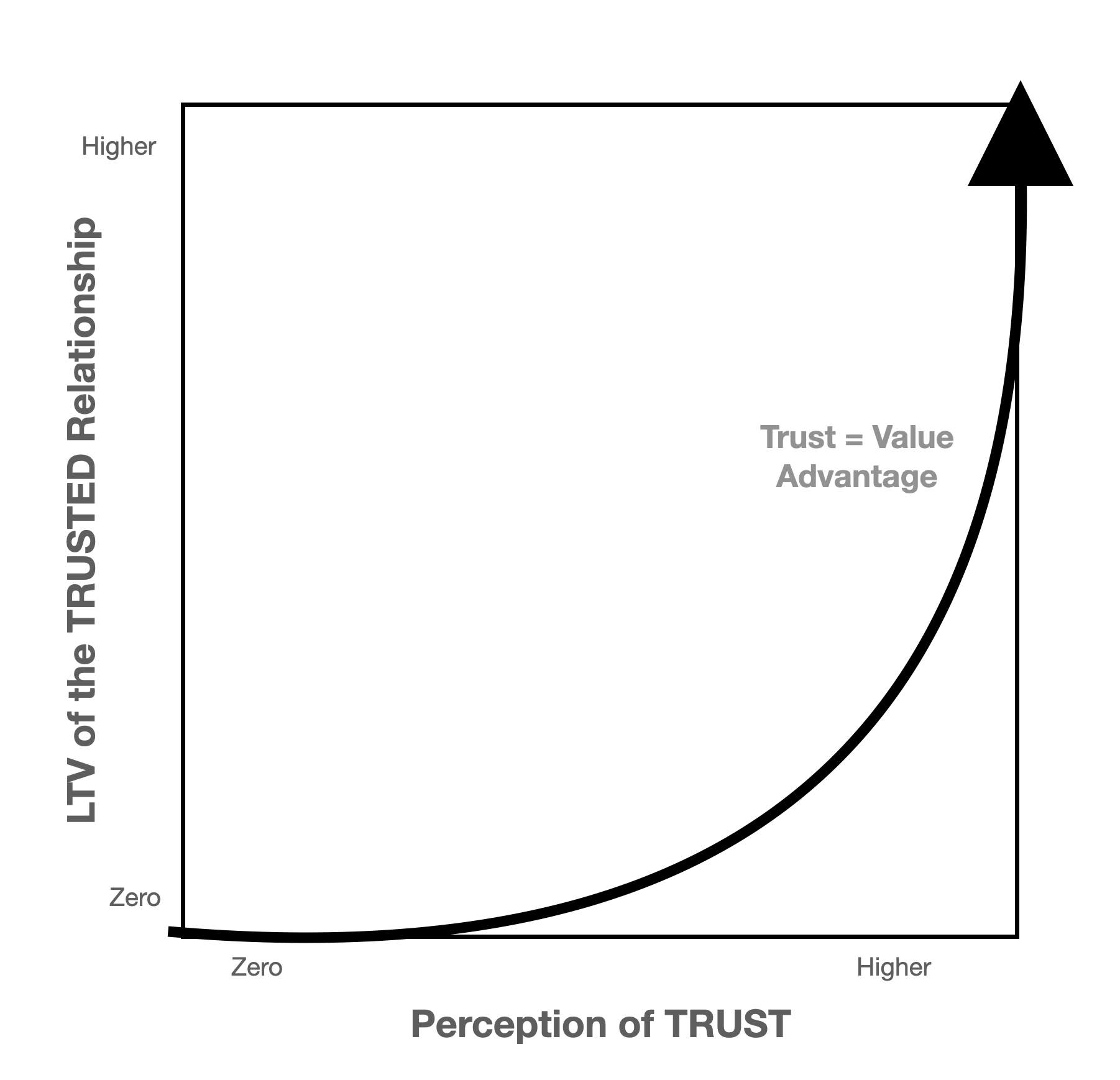
And this brings us full circle
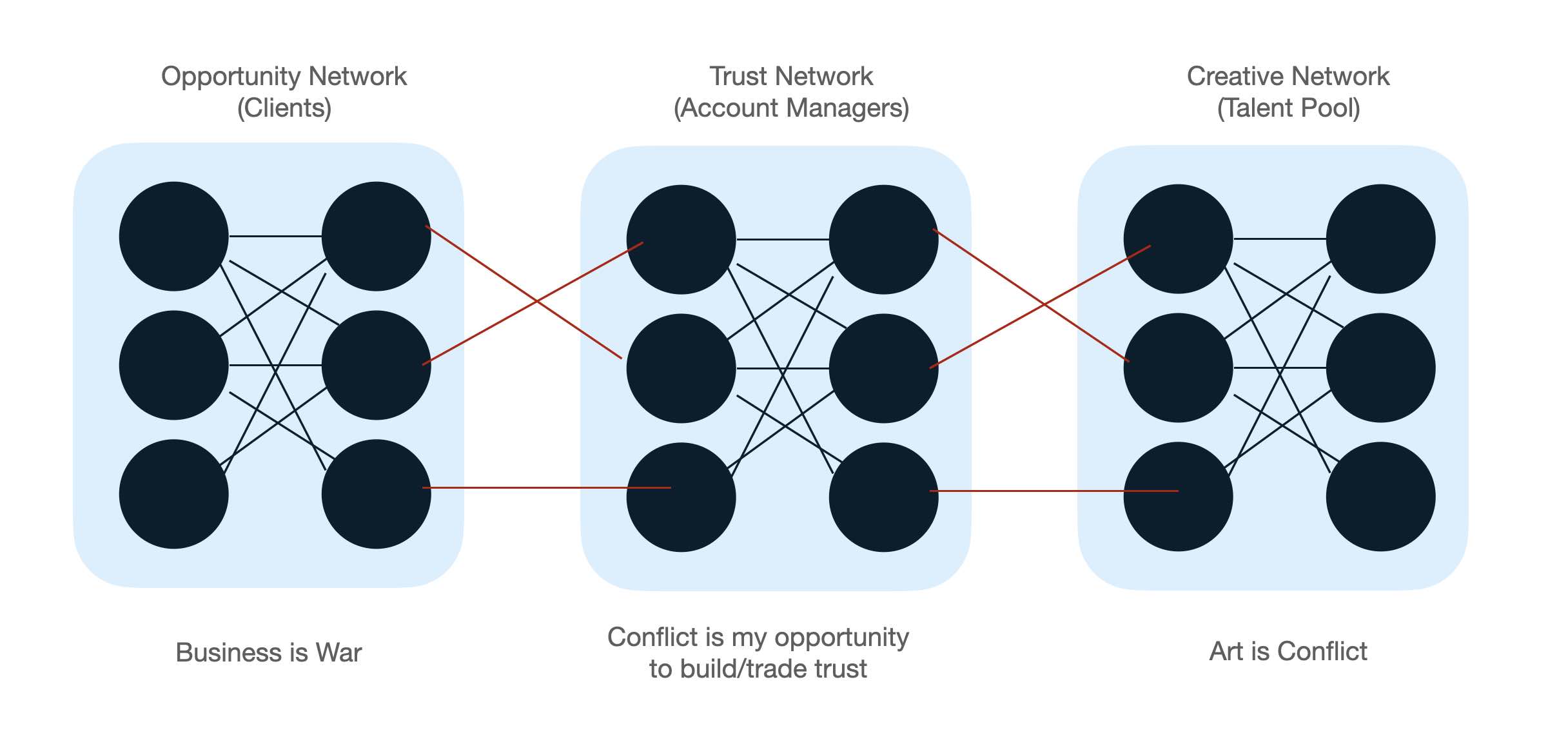
To the ideas outlined in the The Agency of the Future and The Innovation Marketplace
and the idea of rethinking brands as bridges (of trust)
But the point I want to make here is Trust is an emergent property
It can't be seeded into a network. It is the network... It is what brings the network into being
But like all things the energy from this explosion of trust slows over time. It become fossilised. Rigid. It becomes formalised. Rules based.
and this is where our ideas about contagion... injecting ideas and habits into the network... and the moat we call network effects come from
It also explains how and why distrust kills the energy of trust shared across a marketplace
and this is a radical way of thinking about Trust because once we assume trust to be emergent we understand how we can design for trust
We recognise the role of the trust factory in the design and manufacturing of trust
We understand if the agency of the future is to be the market leader in the trust business then it (and ultimately its product and services) must be emergent
They are very simply, in the business of designing and manufacturing emergence....
Or, put another way, a new way of thinking about our relationship with trust
and finally we discover the pricing model of the Agency of the Future
Today we price our products and services as the cost of manufacturing creative and the cost of reaching eyeballs (on demand)
Maybe tomorrow - who knows? - we'll price them as the cost of igniting trust (on demand)
Maybe... :)
Part Four
To help pull this thread on the future of trust together I have inserted this exCapite blog post from early 2014
It was titled: Thoughts on a game of thrones played out in a house of cards
and it was part of one of the last threads I wrote before closing down the blog

The theme of this latest dash is, if you haven't worked it out by now, progress. The nature of progress. How do we measure progress? How do we know if we are making the right progress? Are we progressing in the right direction? Indeed, are we progressing at all?
For example. Take the new Yellow Pages (Think: Google). The old was a list, as is the new. But each in their own way a very different type of list. Gaming the old Yellow Pages was a question of size. Biggest Ad won. But everybody who wanted to be, or could at least afford to be, was on the list. When it came to finding a plumber you were in with a chance. However small. With the new list only the fittest survive. Digital Darwinism expressed as a list. Not everybody makes the list and if you are not on the list you are not in with a chance. The game of lists has changed. As has the art and science of gaming the list. We have progressed but somehow to a less equitable place.
And to challenge this paradigm new lists emerge. Seemingly the unscaled heights of this new era of innovation revolves around the question is the new White (Think: Facebook) the new Yellow? The dynamics of the list stay the same. It's just that the plumber has a choice of lists to expend his promotional dollar. We have moved from the battle of the "book of lists" to the battle of the "list engines". The database for... whatever it is you are looking for in life.
This then is the sum of our progress. And yes it has come at a price. We have, as they say, been disrupted.
All of which provides the context of this post. Bitcoin as a measure of our ideas about progress.
We'll begin with a bit contextual analysis. The piece in question? Marc Andreessen's NY Times Op Ed - Why Bitcoin Matters.
This chart maps the frequency of 40 keywords repeated throughout the text. Words commonly used in Banking and Finance are in blue. The red indicates the language preferences of the technologist.
The question at hand? Are we talking about a new way of banking, a new technology or simply a case of eloquent product placement?

What do you think? Other than the simple observation that frequency also matters. Promotion is nothing if not a matter of repeating messages.
For the record the split across the Top 40 Words is 51%/49% in favour of Banking and Finance. Across the Top 10 however the split is 63%/37% in favour of the Technologist. Marginally lower if you dispute the word "Value" as attributable purely to the Technologist.
Remove the product promotion of the text and we discover the split is 67%/33% in favour of Banking and Finance.
Food for thought... if only in understanding the construction of the narrative.
Now, rather than deconstruct the whole text in detail, I am going to point you towards two other pieces sources Glenn Fleishman's On the Matter of Why Bitcoin Matters and QUENTIN HARDY's Bitcoin and the Fictions of Money.
Meanwhile I'll continue to explore Bitcoin as a measure of our ideas about progress by virtue of a simple experiment. Admitted lazy. But entertaining nonetheless. A bit of word substitution in the original text.
Let's see what happens when the word Bitcoin becomes the word TRUST and the words Internet and Network become Community. The user, now a member. Distributed now simply shared. Programmers are Psychologists and products and solutions become behaviours and habits. When technology becomes meaning. The ledger our relationship.
Just what happens when we substitute our ideas about technology and replace them with some of our ideas about relationships?
The opening stanza...
"Why Trust Matters
A mysterious new meaning emerges, seemingly out of nowhere, but actually the result of two decades of intense research and development by nearly anonymous researchers. Political idealists project visions of liberation and revolution onto it; establishment elites heap contempt and scorn on it.
On the other hand, psychologists – nerds – are transfixed by it. They see within it enormous potential and spend their nights and weekends tinkering with it.
Eventually mainstream products, companies and industries emerge to commercialize it; its effects become profound; and later, many people wonder why its powerful promise wasn’t more obvious from the start.
What meaning am I talking about? Personal psychology in 1975, the Community in 1993, and – I believe – Trust in 2014
One can hardly accuse Trust of being an uncovered topic, yet the gulf between what the press and many regular people believe Trust is, and what a growing critical mass of psychologists believe Trust is, remains enormous. In this post, I will explain why Trust has so many Silicon Valley psychologists and entrepreneurs all lathered up, and what I think Trust’s future potential is."
Do you see the picture that is emerging? Let's try another section.
"How does this work?
Trust is a community wide shared relationship....The Trusted relationship is a new kind of payment system. Anyone in the world can pay anyone else in the world any amount of value of Trust by simply transferring ownership of the corresponding slot in the relationship. Put value in, transfer it, the recipient gets value out, no authorization required, and in many cases, no fees.
That last part is enormously important. Trust is the first community wide payment system where transactions either happen with no fees or very low fees (down to fractions of pennies)."
and, how about this one?
"What’s the future of Trust?
Trust is a classic community effect, a positive feedback loop. The more people who use Trust, the more valuable Trust is for everyone who uses it, and the higher the incentive for the next member to start using the meaning. Trust shares this community effect property with the telephone system, the web, and popular Community services like eBay and Facebook.
In fact, Trust is a four-sided community effect. There are four constituencies that participate in expanding the value of Trust as a consequence of their own self-interested participation. Those constituencies are (1) consumers who pay with Trust, (2) merchants who accept Trust, (3) “lawmakers” who run the courts that process and validate all the transactions and enable the distributed trust community to exist, and (4) psychologists and entrepreneurs who are building new behaviours and habits with and on top of Trust.
For this reason alone, new challengers to Trust face a hard uphill battle. If something is to displace Trust now, it will have to have sizable improvements and it will have to happen quickly. Otherwise, this community effect will carry Trust to dominance.
Moreover, Trust generally can be a powerful force to bring a much larger number of people around the world into the modern economic system."
And, let's finish up with this
"I hope that I have given you a sense of the enormous promise of Trust. Far from a mere libertarian fairy tale or a simple Silicon Valley exercise in hype, Trust offers a sweeping vista of opportunity to reimagine how the financial system can and should work in the community era, and a catalyst to reshape that system in ways that are more powerful for individuals and businesses alike."
Which is all very nice but in the end who needs a post or an essay or an article to bring this message home when a simple tweet would have sufficed?
"Trust me, because this changes everything."
Which is to say the text needs no further analysis or criticism. Simply because it is, in so many ways, a micro self-critique of the American condition today. Our, or should I say their, ideas about relationships and technology are interchangeable. You could call it relatology or technolation but, either way, at its heart is a love for soft innovation.
Bitcoin may, or may not, be the currency of tomorrow but it is a clear measure of our ideas about progress today.
Given the choice between hard innovation. Innovation that bleeds. Innovation that cuts the future with an edge. Innovation that breaks through. Setting fire to all our platforms and life boats. We much prefer our innovation soft and cuddly. Low impact and full of promise, of good things for all who are willing to share, tomorrow, with us.
So tell me how do you feel about that and why is it we can't we all be friends?
For it is the "Summer of Love" remixed through this abundance of technolation. Less Beatles, More Bits n' Lists. Sustained by our addiction to these ubiquitous slabs of glass.
Tell me if you think I'm wrong...
At least until next time... ;-)
Part Five
Let's close off this ring of trust with a simple question: Is the blockchain and the crypto industry a new type of trust or simply the manifestation of trust (ie an example of the emergent properties of trust)
We'll begin by putting the blockchain within an historical context
The technology is very simple
You record a transaction on a list and repeat that activity in multiple locations
You have by any definition a ledger… distributed
Or more accurately a single transaction recorded on many ledgers distributed
Hold that thought
Now reimagine the Blockchain in the age of Cuneiform
You would have a single transaction recorded on many clay tablets distributed
The only question would be how do you achieve distribution?
Do you create replicas at the point of origination and then ship the tablets (via trusted parties) to multiple locations?
e.g. imagine the wonders of the internet, all fibre optics, bare metal servers and bits and bytes, but manifest as donkeys, clay tablets and woven baskets
Fast forward to the middle ages and you speed up this distributed ledger model using parchment and pigeons
Jump again to the 19th Century and you have the wonder of the telegraph. The speed, the reach, the distance… the nodes… the distribution
And it raises the question why now? Why do we need a distributed ledger now and not then?
What is the benefit, the advantage, the blockchain offers that the wonders of the donkey, the pigeon and the telegraph couldn’t offer before?
Or, let’s put the question another way… What has fundamentally changed about our perception of trust that leads us to believe a distributed ledger changes everything?
Let’s try to answer that question by taking another look at key extract from Andreessen’s NY Times OpEd on Why Bitcoin Matters
Byzantine Generals Problem. To quote from the original paper defining the B.G.P.: "[Imagine] a group of generals of the Byzantine army camped with their troops around an enemy city. Communicating only by messenger, the generals must agree upon a common battle plan. However, one or more of them may be traitors who will try to confuse the others. The problem is to find an algorithm to ensure that the loyal generals will reach agreement."
More generally, the B.G.P. poses the question of how to establish trust between otherwise unrelated parties over an untrusted network like the Internet.
The practical consequence of solving this problem is that Bitcoin gives us, for the first time, a way for one Internet user to transfer a unique piece of digital property to another Internet user, such that the transfer is guaranteed to be safe and secure, everyone knows that the transfer has taken place, and nobody can challenge the legitimacy of the transfer. The consequences of this breakthrough are hard to overstate.
Look closely and you’ll see the slight of hand Andreessen pulls off in these 3 paragraphs
Paragraph one states the scope of the problem to be Trust across a Many to Many relationship
Paragraph two restates the scope of the problem but notice the subtle shift. It is no longer specifically about Trust between a Many to Many relationship
Paragraph three declares Bitcoin solves the problem of recording the one to one transaction across the internet between unrelated parties
Essentially Andreessen takes the miracle of the Loaves and Fishes and turns it into sharing marshmallows around a camp fire
It’s what magicians call the prestige
Every great magic trick consists of three parts or acts.
The first part is called "The Pledge".
The second act is called "The Turn".
The magician takes the ordinary something and makes it do something extraordinary.
Now you're looking for the secret...
but you won't find it, because of course you're not really looking.
You don't really want to know.
You want to be fooled.
But you wouldn't clap yet.
Because making something disappear isn't enough; you have to bring it back.
That's why every magic trick has a third act, the hardest part, the part we call "The Prestige"."
And it speaks to the nature of trust
Trust is a game of risk and reward
It is arguably the game of life
You see trust is risky but essential if we are to function as a family, As a society. As a community, As a market
The mistake we make when it comes to weighing up the risk and rewards of trust is we measure reputations rather than motives
And if we turn our attention back to Andreessen's NY Times OpEd on Why Bitcoin Matters and put aside Andreessen's reputation and simply focus on his motives I would suggest the article deserves another reading… a reading with context… the context being what commercial advantage - what motivation - would a VC be seeking by promoting a new technology called Bitcoin?
I'll leave you to work through that challenge for yourselves… but I do want to say this speaks to the heart of what the future of trust is… at least within the commercial context of profiting from an investment in the rise and rise of the distributed ledger
Because although trust permeates every interaction on the web and in life, on so many levels trust is best understood as an illusion
It’s been 7 years since Andreessen's NY Times OpEd… and 7 years since I wrote that post deconstructing his ideas about Bitcoin and Blockchain being future of trust
In 7 years Bitcoin’s price has been the bubble of the decade and investment in crypto has exploded
Why?
The simple answer is it speaks directly to the emergent properties of trust
The magician declared trust me… this is the future of trust… and the world did
We trusted the storyteller. We embraced the story and a new game of trust emerged
i.e. Advertising & Marketing 101: Change the story and you change the game
Now, after I first read the Andreessen OpEd in 2014 I attempted a little thought experiment. I mapped the bundling and unbundling of trust across the network
My observation was the winners so far were in the business of bundling
Blockchain essentially is a technology designed to unbundle
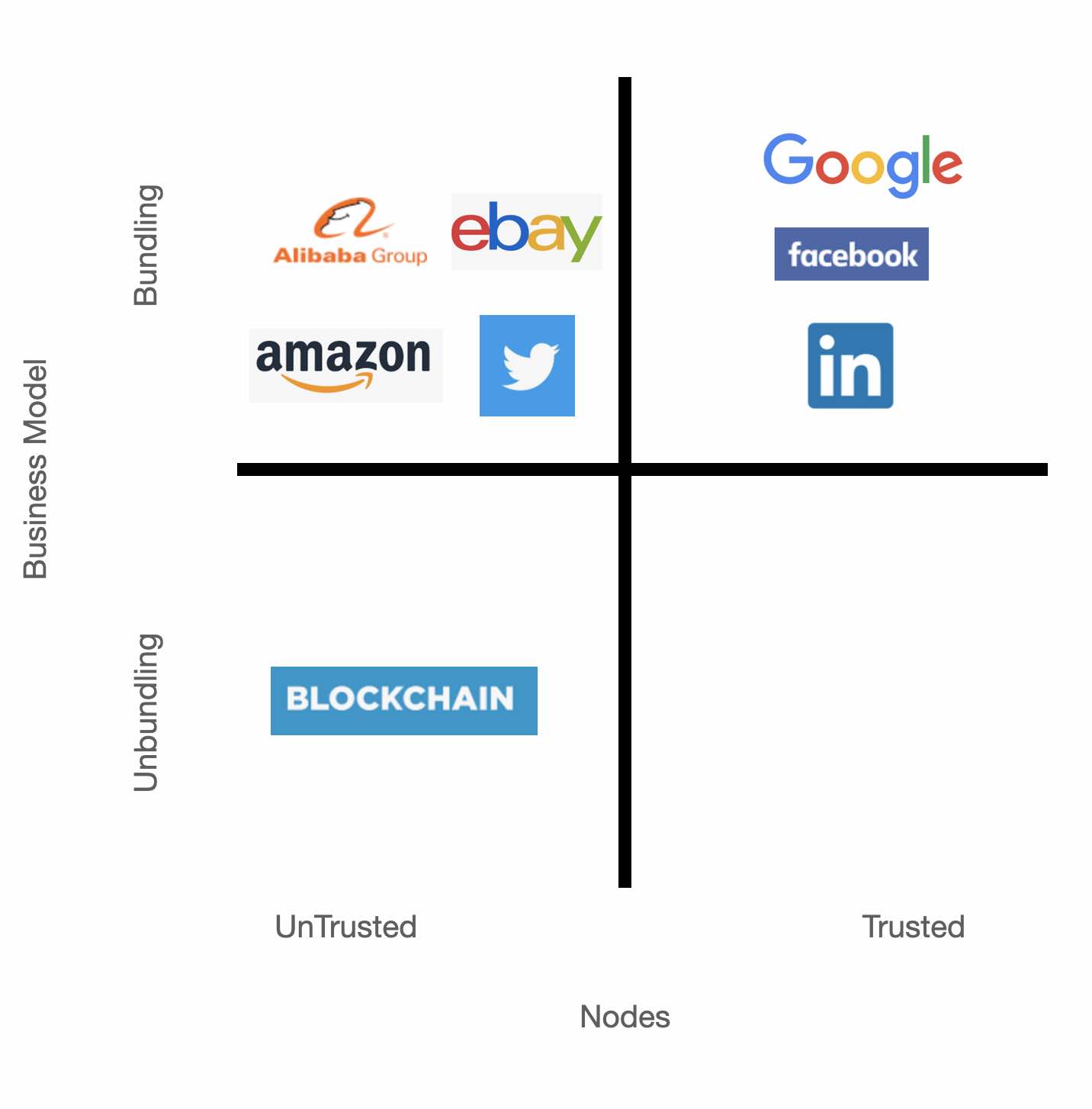
The history of the web and real world markets the digital economy was mirroring suggests the winners of the new crypto economy would be in the business of bundling
Basically there was no evidence that anybody was making money out of unbundling the untrusted
The long tail economy was a winner take all Pareto Curve the players of in the new crypto economy would designs solutions to bundle entrust and migrate it into high value high, margin bundles of trust
Fast forward and what do we discover?
The winners of the new crypto economy are in the business of aggregating trust
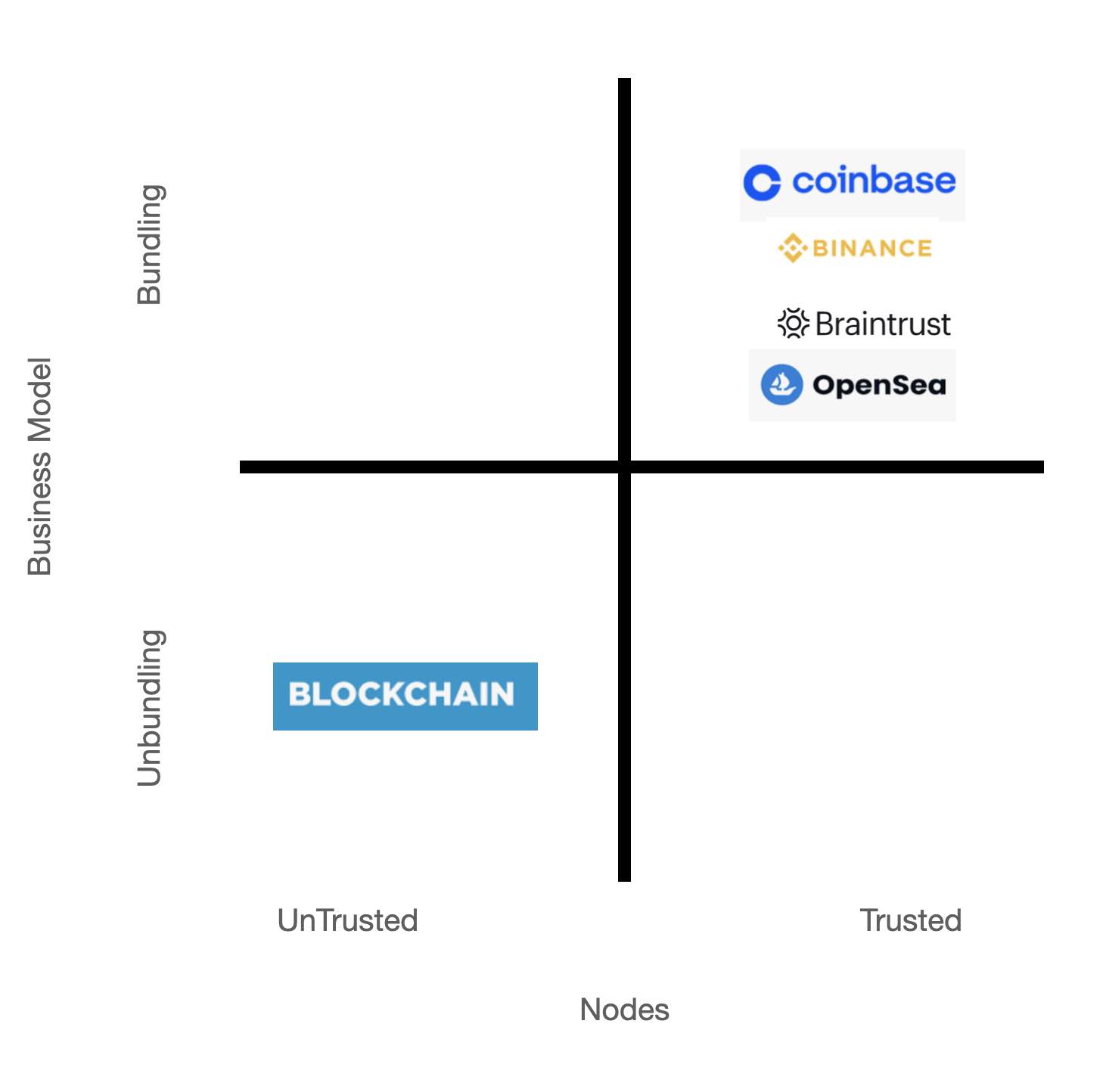
Should we be surprised that a break through narrative of generating trust across the untrusted network essentially replicates the behaviour of the past?
Not really. Does this change everything? No. Not really.
Is there money to be made by embracing this transition to a brave new world of digital trust? Undoubtedly
However the point I want to make is the new crypto economy and the distributed ledger isn't so much a new way of doing as a new way of perceiving and monetizing the illusion of trust
... and it will be valid until the next magician spins a story about the future of trust
In that thread on The Innovation Marketplace I stated Creativity is emergent and that AI has the ability to unlock endless combinations in a fraction of the time
This suggests AI is the future of creativity
The closing observation I want pose now is Trust is also emergent.
And just like Creativity AI has the ability to unlock endless combinations of Trust in a fraction of the time
This I think is a difficult concept to grasp
But it is essentially they way Google allows us to navigate the web and it is at the heart of unlocking the promise of the Agency of the Future
It is also why I think AI will ultimately render blockchain redundant
Why? Because I think AI is the future of trust
However there is a caveat around that forecast
and the caveat is not surprisingly one of trust
You see we trust - at at the very least we are starting to trust - crypto
AI on the other hand less so
We struggle with this idea of trust coming out of a magic box
The difference being
Crypto is the magic trick. AI is the new magician on the block
Unlike Andreessen AI has no reputation to support its position. Perhaps even worse it has no apparent motivations to triangulate its position.
We are left with an open question… are we dealing with the Virtual Devil or a Virtual Angel?
Can we trust AI?
Then again perhaps the question is redundant
Perhaps the question is what is trust if it is proven to be endlessly combinational?
The answer of course is trust is a game of risk and reward.
And just like Go or Chess it is a game AI will play better than any human
Simply because humans are in the habit of finding and sweating on random patterns in random exchanges
and AI will excel at feeding us with random patterns and random exchanges to discover and explore - and if you doubt this go take a look at Garry Kasparov's matches with Deep Blue
In the end I suspect AI's take on trust will both amaze and befuddle us
and I suspect we’ll be both alarmed and enchanted by the magic show
… but then again I could be wrong
But I think the great unknown here is what happens to our relationship with trust when we discover a machine is infinitely better at playing the game?
Will we still have trust in trust?
Now that's a thought worth pondering... At least until next time :)
Part Six
To understand the limitations of crypto and the blockchain as a solution to the trusted network problem we need to begin by defining just how complex it is to measure trust across a network
Let's begin by referencing a well known board game
The game is Diplomacy
Invented in the 1950's. It is based on the politics leading up to WW1
Essentially it is a game for 7 untrusted players (Think: Nodes) each representing one of the great European Empires (Think: British, French, Italian, Russian, German, Austro-Hungarian and Turkey) in the year 1914
The rules of the game are you spend 30 minutes negotiating with the other 6 players and then you write down your troop movements for the 1st round
The instructions are tabled simultaneously and the participants quickly discover who their friends and enemies are before repeating the 30 minute negotiation and planning cycle
Unlike other military strategy games Diplomacy has no dice. There is no element of chance. Success comes down to each player's ability to read and influence the room
It is the Byzantine Generals Problem time boxed and played out on a table
The game was popular with diplomats (e.g. Henry Kissinger) … and could be played remotely by telephone
Obviously the replication of the board game and the remote correspondence of the troop movements over the telephone could be interpreted as a real world distributed ledger
This suggests the global distributed ledger solution to the BGP was resolved decades before the advent of the blockchain
The playing of chess via mail would be another real world example of a playing board replicating the wonders of the distributed ledger
and indeed the much smaller P2P challenge positulated by Andreessen in his 2014 OpEd
Now hold that thought while we try a different question
Did the Diplomacy board solve the trust problem between the players?
Simple answer. No
It documented the progress (think: outcomes) of the interactions of the players in this untrusted network (i.e. it bundled the actions of the untrusted nodes) but it didn’t resolve the trust problem
Indeed the board and the rules of engagement with the board are specifically designed to create trust problem between the players
Diplomacy is a classic example of No Conflict. No Interest.
Would putting Diplomacy on the Blockchain resolve the trust problem? No. It would simply add to the expense of running the game
Now hold that thought while we try a different question
What is the difference between Deep Blue and the Chess board?
or,
more recently, AlphaGo and the Go board?
The simple answer is the machine is no longer a ledger (Think Database) recording the players' moves it’s now a player
Now imagine what it would take for a machine to play Diplomacy
To help you visualise this I have reduced the game to a 5 Node Network
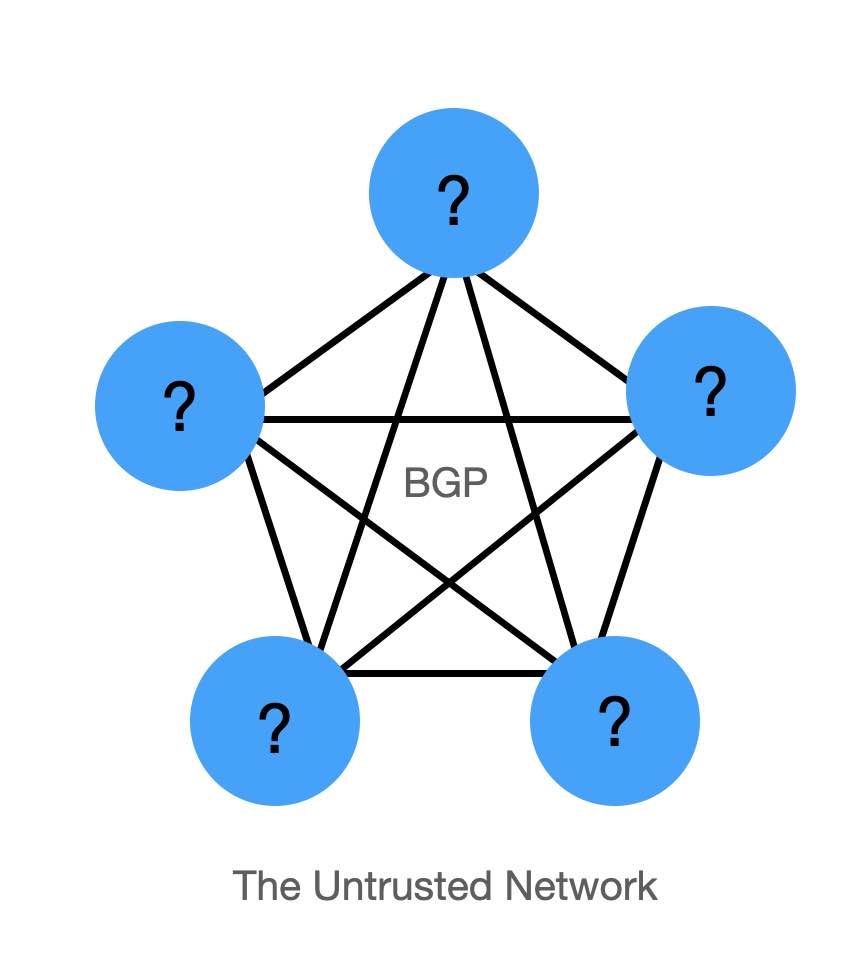
To help you understand the nature of the challenge I have created a simple formula for Trust
(Trust = Reputation + Motivation)
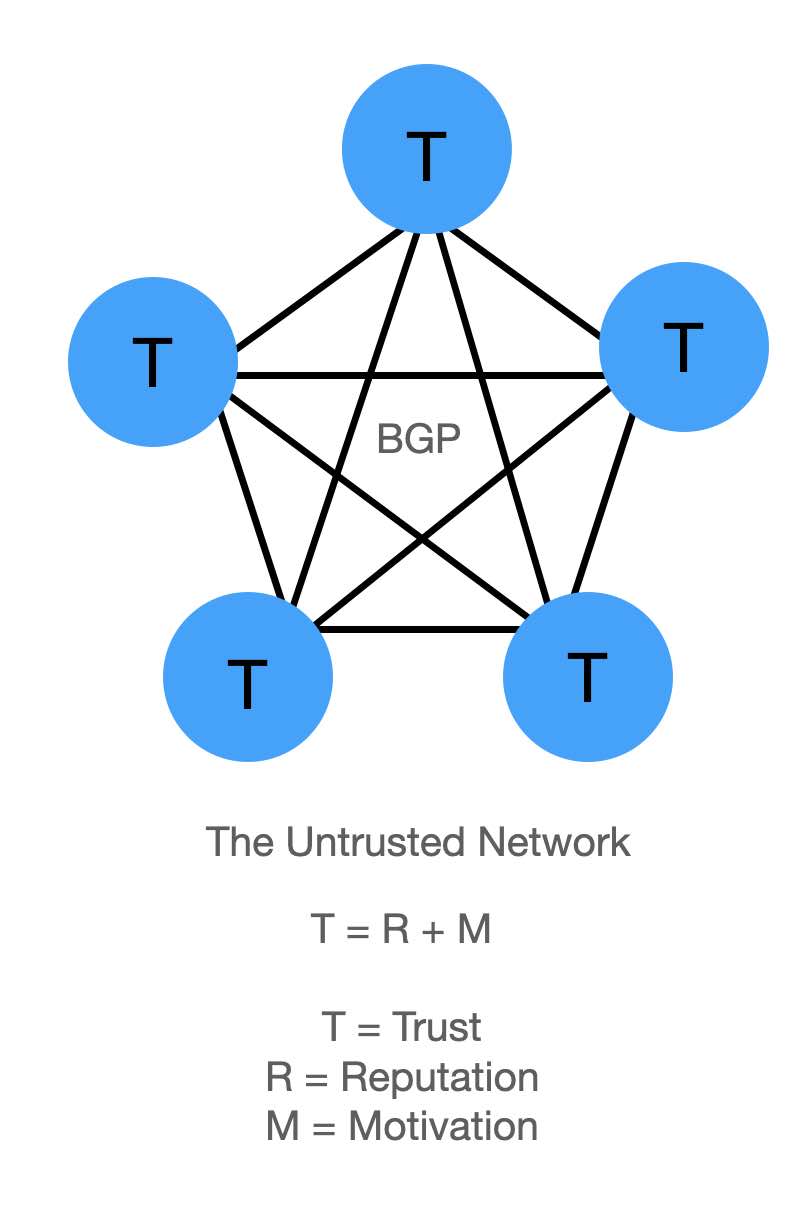
The challenge for each player is to estimate a Trust score for every other player
You would do this by trying to estimate the Trust between each pair of players
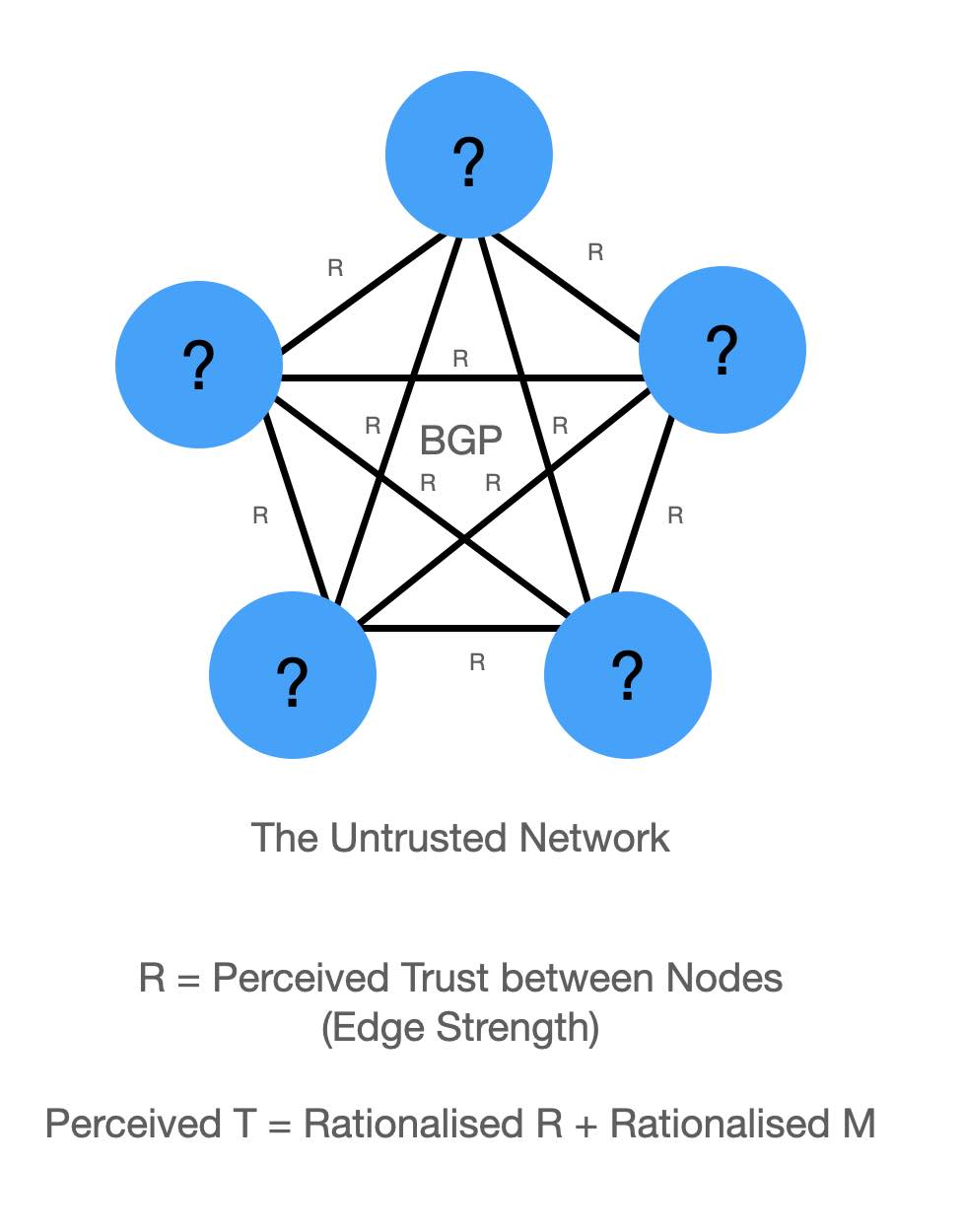
After the first round it becomes a little bit easier because each player will have declared their intent
We now have a public position to feed into our equation
But we also have to estimate their private position (I.e. they may say this but - under the right conditions and influence of other players' actions - they may do that…)
Only then will we be able to forecast a consensus position of how Trust may be distributed across the network (ie who trusts who… and more importantly who will you trust?)

Now the task of mapping your impressions of where you stand with the other players is easy
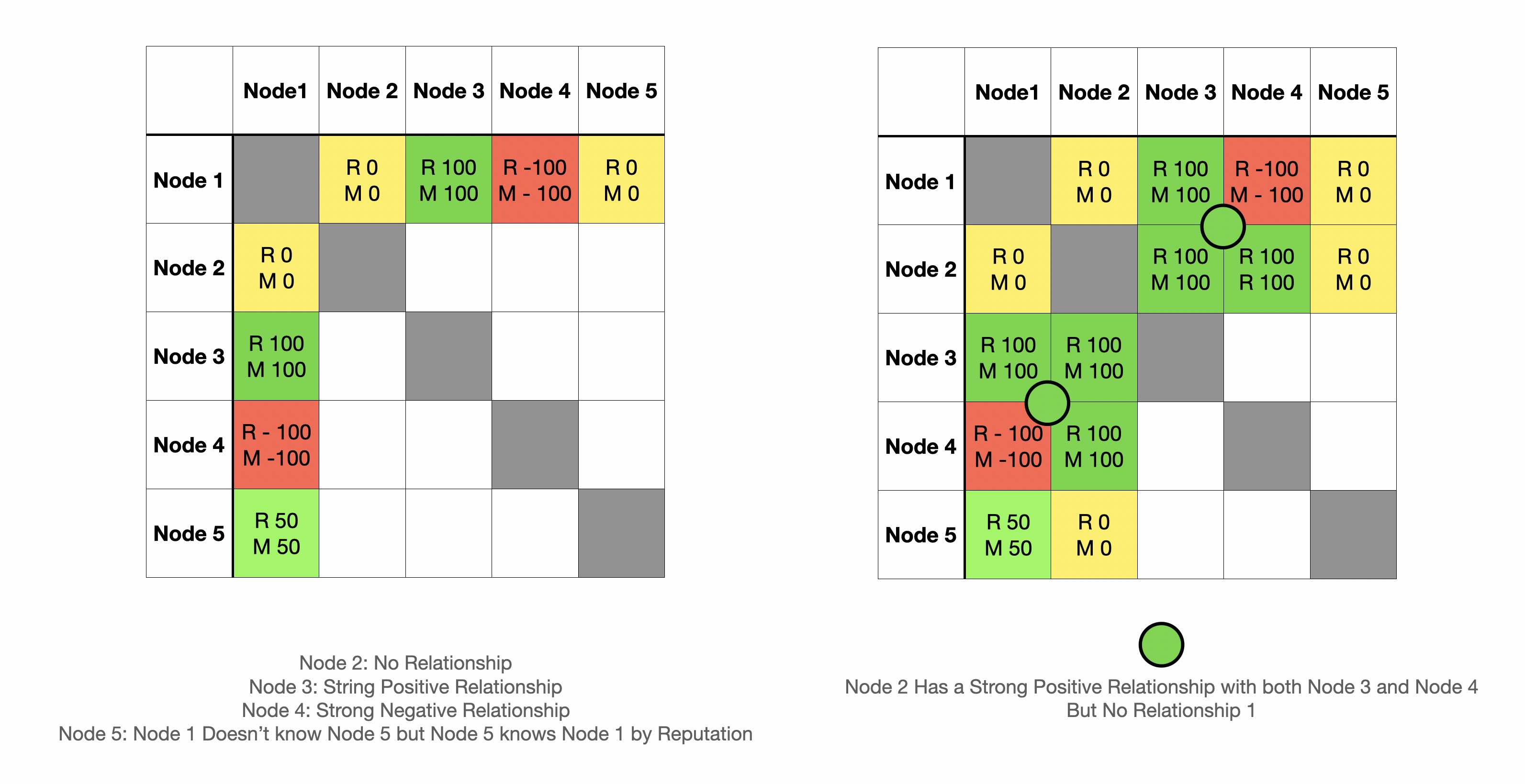
It gets complicated when you try and estimate the positions of the other players in relation to the other players
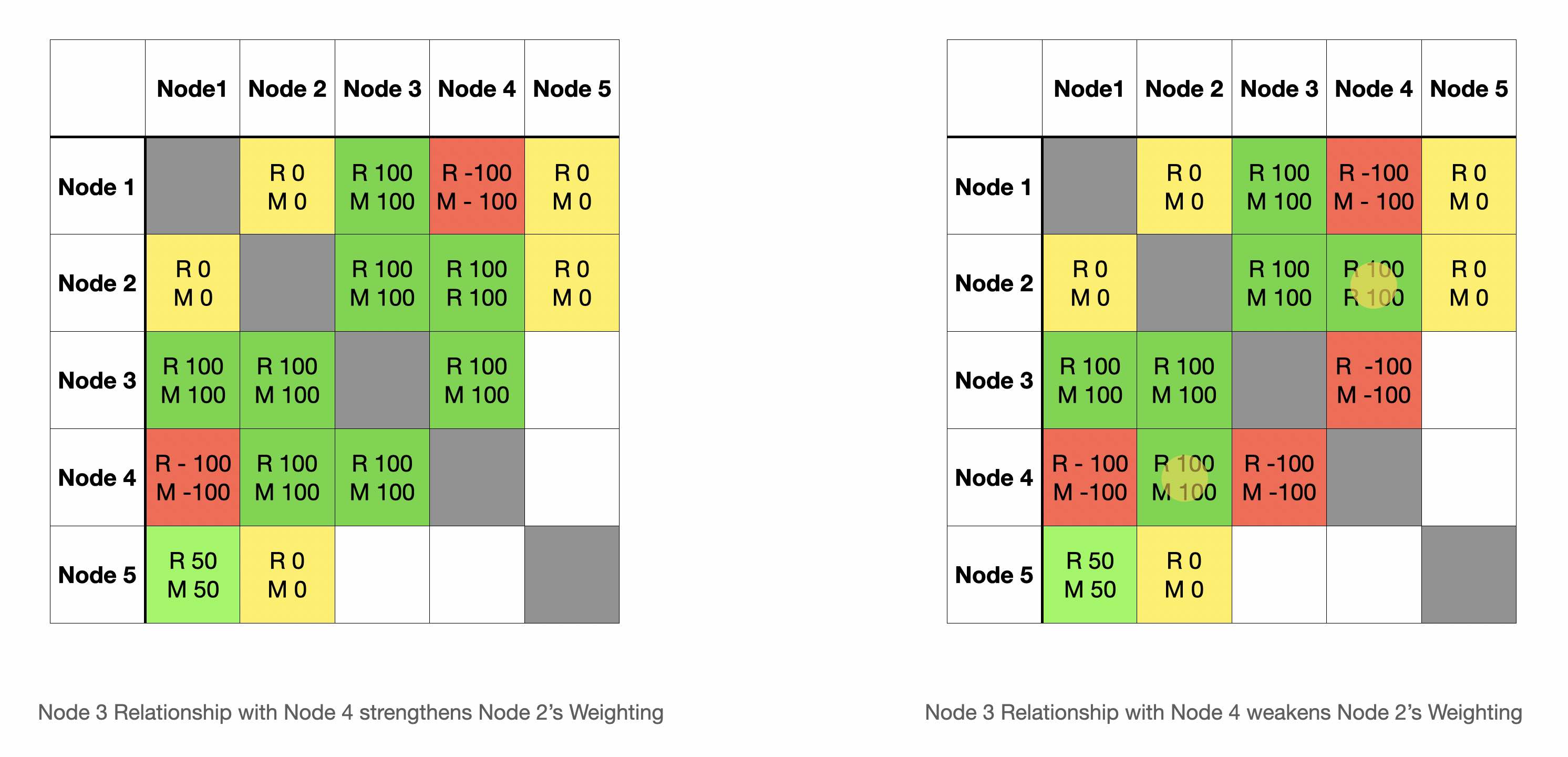
A positive of negative relationship can sway the network in your favour or against it
The more relationships you attempt to map the more complex the challenge becomes
Most people struggle with the complexity and use mental short cuts (Think: She has a nice smile she wouldn’t invade my territory)
Now let’s take a look at how a simple Neural Network may handle the challenge

First thing you’ll see is this is not a distributed ledger. It’s a probability matrix.
It's designed to solve a complex problem.
And here is the difference between AI and Blockchain
AI is a Statistical Model of Trust (i.e. A Guestimate & Fallible)
It is designed to forecast the answers to complex problems
It is designed to play the game
Blockchain is a Numeric Model of Trust (i.e. Absolute & Indelible)
It is designed to store (in memory) the contributions of the players attempting to play the game
You could say:
AI is a player. Blockchain is the board
But neither is the game
Part 7
There’s an old saying
When it comes to the pitch if you find yourself explaining then you have already lost
I’ve spent too long here explaining
So let’s wrap this up quickly
What is the game?
What is the game advertising is in?
In the 20th Century Advertising Agencies sold clients stories that changed the game
Meanwhile Management Consultants sold clients business transformation projects
Today Digital Advertising Agencies sell client mobile experiences, websites, branding strategies, content creation, email campaigns, meme factories, click farms, adtech, social engagement, social monitoring, search engine optimisation, influencers, likes, shares and page views branded as digital advertising and marketing
The more progressive are dealing in NFTs, VR, AR and Games
Meanwhile Management Consultants continue to sell clients business transformation projects (now branded as digital transformation projects)
But their story remains unchanges... they are in the business of convincing clients to spend more money so they can do more with less
As a throwaway I'll also point out that VC's are in the business of investing in the players (and their games) that change the story
Upon deep reflection, and having come this far, I honestly think the agency of the future is the agency of the past
It will be in the business of selling clients stories that changed the game
How will it do that?
It will go back to basics
It will mine the zeitgeist, distil the essence of what people are talking about and then deliver it back to them… amplified
Basically it will be what it always was… reverse engineering the zeitgeist and then turning up the volume (way past 11 :)
Why? Because advertising isn’t the ad. It’s about what happens after the ad. It’s about generating a response and that response is word of mouth
As Oscar Wilde once said, and Donald Trump has clearly demonstrated in recent years
If there is anything worse than being talked about. It’s not being talked about
That’s the game
Everything else is just noise